Revisiting
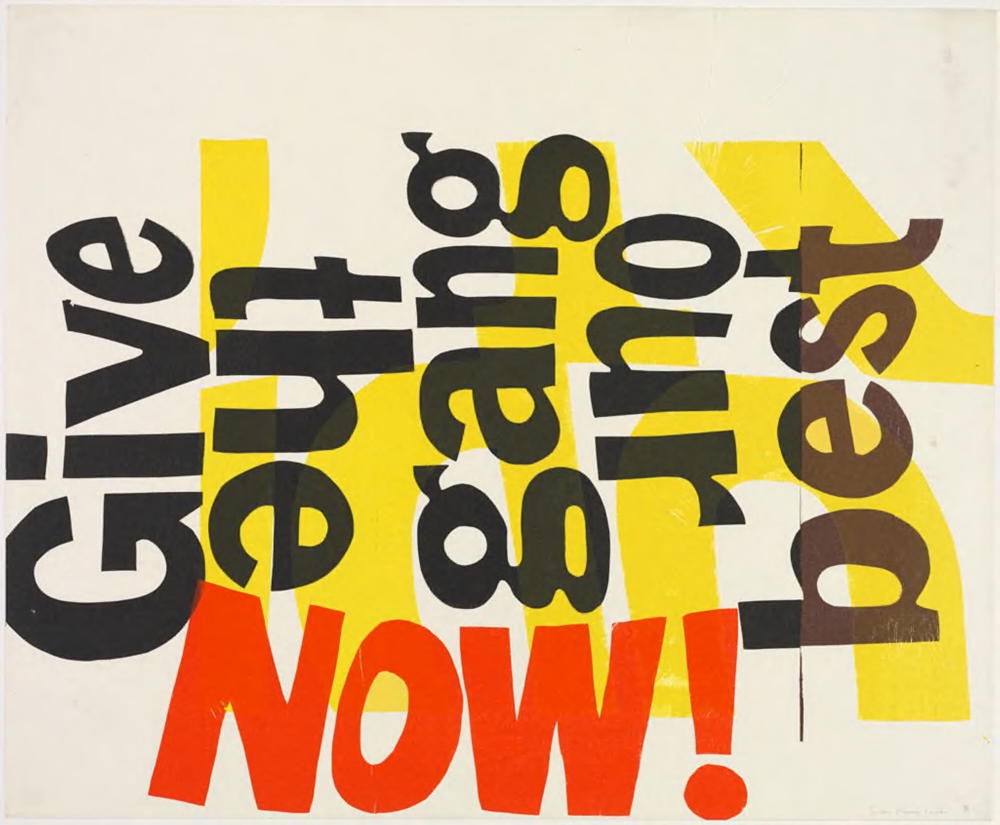
Corita Kent (Sister Mary Corita): give the gang our best (1966)
"…genuinely inept actors."
I ask myself which FollowingChapters Story might be "the best" without really expecting anybody to answer my question, let alone myself. The question itself seems irrelevant because I never intended there to be any competition between them. Sure, some seemed better and others worse at inception, but often, the stories that seem the worst to me when creating them attract the most positive attention once I post them. My nose seems reliably unreliable. But then, I do have my favorites, the ones that seem the most resonant and those that surprised me, even a few that delighted me. It's noisy at my writing desk when I'm writing and even noisier when I'm reading through what I've just finished, then noisier still when I'm compiling a series of pieces into a comprehensible whole. And even noisier, though this never seems possible, when I sit down to peruse what I've compiled, reading through the collection for the very first time.
How many times might I need to read through the whole collection to pass fair judgment upon the whole, let alone to gain enough traction to definitively choose one story as "the best?"
FollowingChapters: Series_Recap

Utagawa Hiroshige 歌川広重: Asakusa Ricefields and Torinomachi Festival
(Asakusa tanbo Torinomachi mōde), from the series One Hundred Famous Views of Edo
(Meisho Edo hyakkei) (1857 (Ansei 4), 11th month)
With Liberty Tagging Along I began this FollowingChapters Series after spending the prior two quarters writing a series I’d titled NextWorld, in which I attempted to predict how my world might change under the upcoming and now current administration. I’d then completed a series I’d titled CHope in which I tried to maintain hope that my world might not be completely demolished by near absolute idiocy, somewhat successfully. Then I faced a next quarter. What would be my writing focus then? I chose the title FollowingChapters because, from my perspective at the time, I couldn’t foresee what might exist after I’d successfully investigated my NextWorld and projected much Hope. I’d enter my FollowingChapters.
Slip over here for more ...Weekly Writing Summary For The Week Ending 09/18/2025

Reinier Vinkeles: Cornelis Ploos van Amstel (18th century)
And Win Every Morning
This is how my thirty-third series ends, as they've all ended, with more of a whimper than a bang. I consider stories that build to a satisfying climax to have been engineered to yield that effect. Since this and every previous entry in my series focused more on my actual experiences, I couldn't engineer such plotlines. I could draw conclusions, however preliminary, but I could never actually know how any of my stories would ultimately turn out because the meta-story I was inhabiting had to remain ongoing; otherwise, their author couldn't be present to create the current installment. Or the next. Life works like that.
With each ending comes the question of whether I'm really up for another beginning.
Irony

Attributed to Cornelis Anthonisz.: The wise man and the wise woman (1540 - 1545)
"Imaginary performance. Man and woman with all their attributes, represent many virtues and biblical metaphors. A woman with horse legs and hooves holds in her right hand a stand depicting the crucified Christ and in the other hand a can, a lock on her mouth, a dove on her chest and a snake around her waist. Man with compass and scale and dog at his feet. Left and right of the presentation text in Dutch."
"These lessons will be lost on even the very best of them."
The proper administration of Irony requires something other than mere administrative or standard leadership skills. It first demands of its incumbent a sincere dedication to obliviousness. This requires the opposite of focus. One must also be more than merely capable of producing endless streams of serious non-sequiturs, but possess the parallel ability to never once catch just how self-disclosing these seem to everyone else. One must also maintain multiple hidden agendas that remain open to public acknowledgement, ensuring everyone understands their purpose better than their creator. The entirely successful incumbent will pick fights he cannot possibly win, only to pick additional fights whenever it's clear he's lost. He must never admit to any wrongdoing and must convince himself, if only ironically, and nobody else, that he's not the biggest loser to ever hold office. Above all, the obliviousness must be sustained at all costs. Undiagnosed cognitive dysfunction, a definite plus.
Sycophancy also seems a must for the proper administration of Irony.
Corrupting
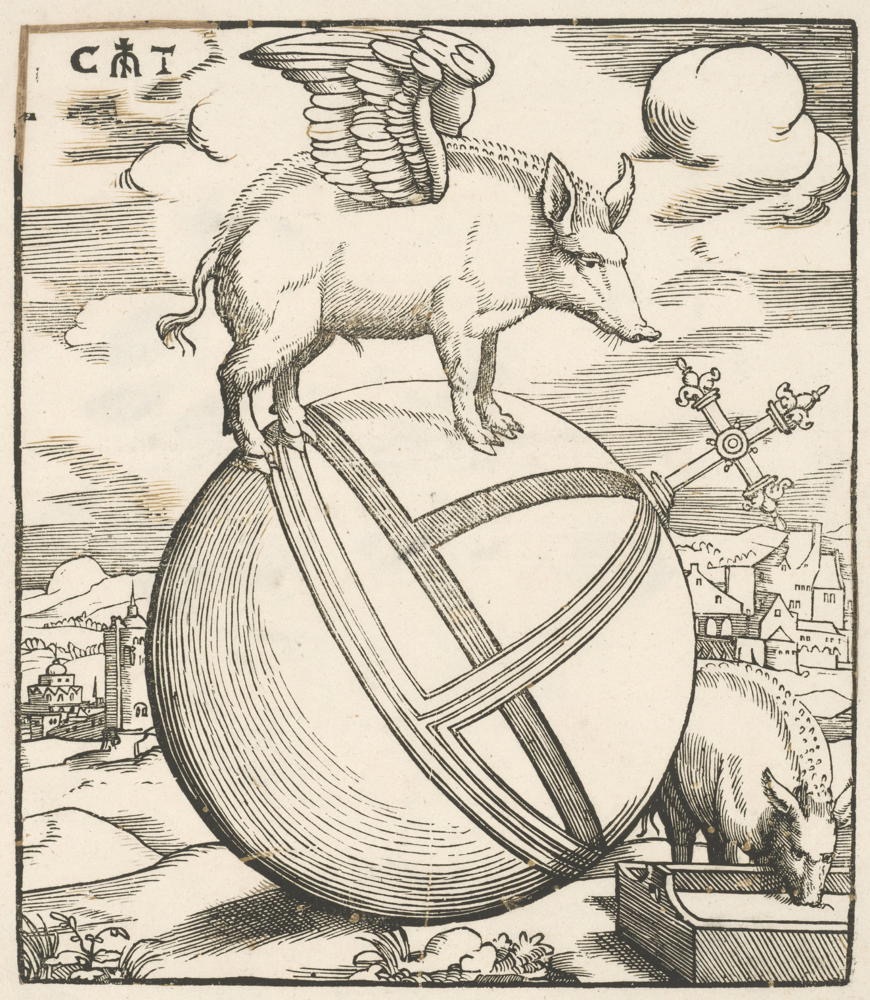
Cornelis Anthonisz: The winged pig in the world (1541 - 1545)
Allegory of the corrupt world: winged pig standing on imperial apple.
Second pig eating from trough.
"Those who insist upon living in glass houses must restrain their public actions."
Few crimes seem more misaligned than corruption. Those to whom trust has been extended betray something more than that trust when they engage in Corrupting behavior. They corrode themselves first. Stealing from the public purse seems much worse than any other sort of burglary. Violating simple comportment rules can quickly become complicated. A twisting occurs, first of ethics and later, of respectability. Those who profit from their service are rightly seen as beneath contempt. No excuse ever erases the stain. No apology ever undos the well-deserved disdain. Those who believe themselves to be above the law demonstrate only how far below it they've fallen. Bottom feeders deserve the dregs.
Our current administration conducts a master class in corruption.
Loose_Talk

Lucian and Mary Brown: Untitled [man giving speech in rain] (c. 1950)
"I just wonder why."
This country was founded upon the ideal of Free Speech. In practice, it has always struggled to draw the distinction between Free Speech and Loose_Talk. Free Speech suggests that one might feel free to say anything they care to say to or about anybody. Civil discourse, of course, demands a few dampers be placed upon the full and, dare I suggest, free expression of observations. Likewise, simple civility might also suggest that certain speech be squelched lest someone take offense or choose to be offensive. Mark Twain suggested that while we might have the freedom to speak our minds, however addled, we also hold an overweening obligation not to, or not to very often. The distinction between Free Speech and Loose_Talk resides in the ear of the listener, though most speakers might understand where one begins and the other ends for themselves, if not necessarily for any other. Libel laws are notoriously difficult to enforce. Same with slander.
It's apparently not nearly enough to insist that individuals must carefully edit their utterances.
Persevering
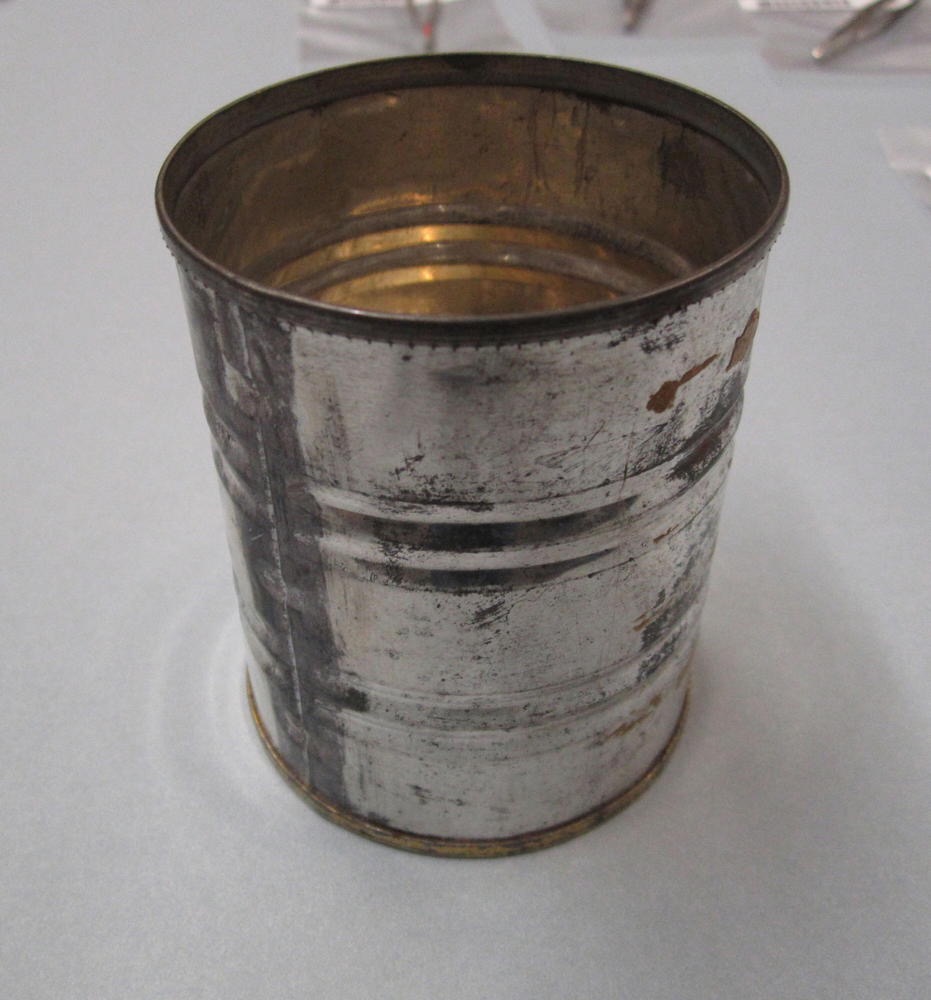
Tin can formerly containing tweezers: Archival Material (20th century)
Aluminum, Dimensions 8.3 x 6.9 x 6.9 cm (3 1/4 x 2 11/16 x 2 11/16 in.)
Collection of Barnett and Annalee Newman - Estate of Annalee Newman -
The Barnett and Annalee Newman Foundation -
Harvard Art Museums/Straus Center for Conservation and Technical Studies,
Gift of the Barnett and Annalee Newman -
Exhibition History: Barnett Newman: The Late Work, Menil Collection, Houston,
03/27/2015 - 08/02/2015
"…still as fresh as they day they were preserved, Persevering."
Every Late Summer since we coupled, The Muse and I have practiced Persevering in the form of preserving. I suspect it was no accident that these two terms so closely resemble each other, for the purpose of our preserving has always been Persevering, for we are accomplishing more than merely "putting up" some produce. I always sense myself back in my mother's kitchen receiving instructions on how to slice a pear in half against my thumb—a task I'm still too squeamish to blithely perform, for I fear I'll cut myself, though I never have. The very act of attempting to Perservere preserves something in addition to the fresh produce we will consume through the upcoming winter. We preserve a seemingly fading lifestyle, a passing, nearly past imperative, one that sustained generations before ours. We ache to reprise this dance each year, and so we do.
It was always inconceivable for us to miss performing this sacrament.
Cadency

Léopold Survage: Plate V
[Rhythmes Colorés: Cinq Lithographies Originales in Couleurs
(20th century)
"My presence will be best represented there in the future by my absence."
The Muse and I went to dinner last night with a group from a local alumni association. This group does good works, and our host helps. In addition to their good works, they also organize these suppers where three or four couples gather to share courses and conversation. We were responsible for the appetizer course. The Muse made some fancy crackers adorned with goat cheese and Mirabelle jam. She also made some icy hot gazpacho to serve as soup. Another brought a salad, another wine, and another a rhubarb pie. Our hostess made a casserole with deplorable green beans that were overcooked, leathery, and nasty. Fortified and distracted, we commenced to attempt to conduct a conversation around that table.
The conversation did not go well.
Invitations

James Abbott McNeill Whistler: Invitation Card (1882)
"I am not one of them."
I feel baffled by the odd attraction some seem to feel about the Invitations that MAGA characters offer. It appears as though they extend permission for others to engage in whatever truly awful behavior they might have previously felt constrained against, as if they had been impatiently waiting to be offered entry into a genuinely despicable manner of living. I feel no such compulsion, and I cannot imagine any invitation that might convince me to flee into the dark side, but seemingly not so with the MAGA faithful. They immediately start spewing venom with the best of them. Hate speech seems to be their small talk, and bitter accusations, their typical conversation. It looks as though they've been granted grudges as a reward for their entry.
They seem to require near-constant reinforcement, as the media machine they subject themselves to repeats the same ugly memes like catechisms.
Weekly Writing Summary For The Week Ending 09/11/2025

Salvator Rosa: Five River-gods (1651-1656)
Won't Miss the Weeding
The rains finally came ten days into September. I was awakened by crashing thunder, flashing lightning, and The Muse rushing around slamming windows. I barely acknowledged this long-anticipated event before slipping back into one of my more satisfying sleeps of this evaporating season. The following morning, I walked around the yard satisfied that the gardens might survive even this latest endless swelter. I have reached the age where my sample size seems adequate to reach a few conclusions. I experience summers differently now than I did when I was ten and riding my bicycle around town half naked and berry brown. What was liberating then has become encumbering, a physical and emotional challenge, a survival exercise instead of endless play. With only ten days remaining before autumn arrives, I, too, might survive this summer. I will miss reading beneath a whispering ceiling fan and the early evenings with sprinklers cooling the yard. I will definitely miss The Muse's overflowing vegetable garden, though I won't miss the weeding.
God-Givens

Unknown Russian Artist, Tula:
Flintlock Fowling Piece Given by the Empress Catherine II of Russia
to the French Ambassador (1745 and 1763)
"So much for God's matchmaking skills, and others."
Recently, Virginia Senator Tim Kaine sparked controversy when he stated the seemingly uncontroversial opinion that rights come from laws. Conservatives, spear-headed by the ever-pious Texas Senator Ted Cruise, publicly disagreed, insisting that none other than Thomas Jefferson himself declared that people are bestowed by their creator certain inalienable rights, namely: the right to life, liberty, and the pursuit of happiness, accusing Senator Kaine of disclosing the "Democrat" agenda to ascribe God-Given rights to laws and thereby enabling them to be rescinded upon a whim. House Speaker Mike Johnson chimed in, insisting that while this was the well-known "Democrat" agenda, they weren't supposed to say it out loud. Here's The Hill's report on these exchanges.
This might seem to amount to little more than another vacuous gotcha game exchange between partisans, but it got me thinking about what constitutes a God-Given.
Likelihoods
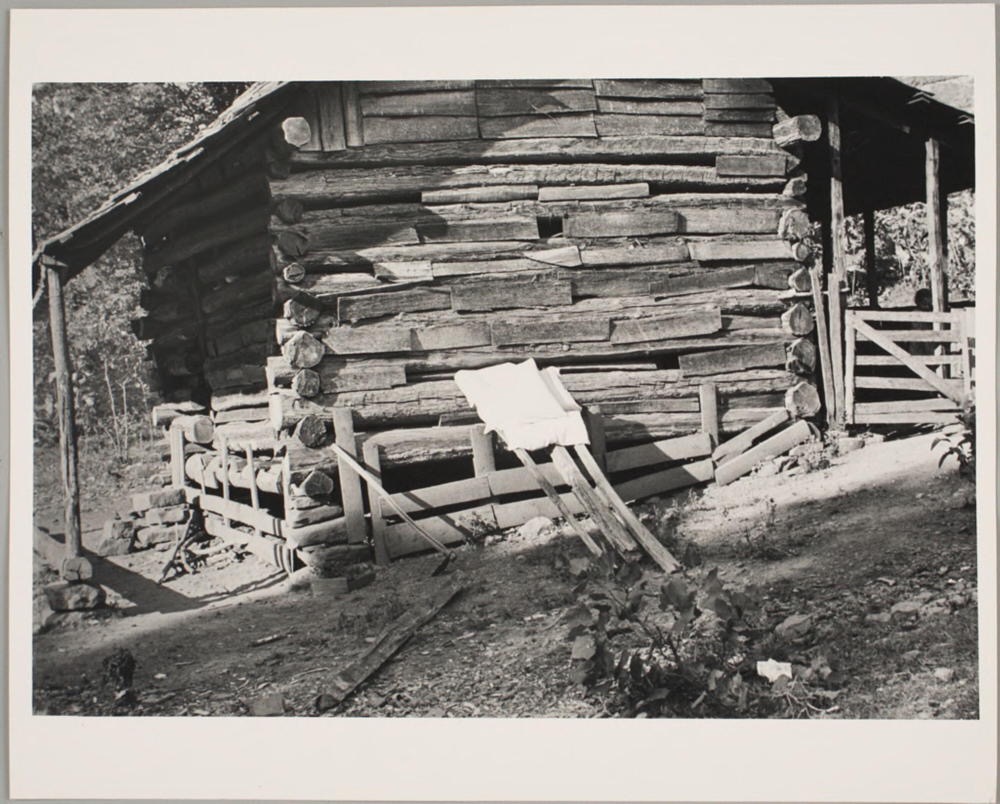
Ben Shahn: Untitled [exterior of home, probably Arkansas] (1935)
"It almost seems as if I disappoint myself on purpose."
I survive the final fortnight of Summer by focusing on what I clearly do not understand. Weather predictions indicated a possibility of rain early this week, but this promise was barely fulfilled with a brief gust and a few scattered drops around sunset the day before yesterday. Another possibility appeared in yesterday's report, but that one also failed to produce. A forty percent chance of rain rarely results in very many raindrops here. Another part of the region must attract the weather through this season, because we don't, or we haven't. This might have something to do with the very nature of Likelihoods, which by their name seem to suggest that a stated outcome will prove likely. We might as easily classify these as Unlikelihoods, connoting the production of an absence, since Likelihood doesn’t always promise the mentioned outcome. A 40% chance of rain means that there's a 60% chance of none.
Even labeling such a prediction a "probability" connotes that something will "probably" happen, and it reliably does.
Stewarding

Urs Graf: The Parable of the Unjust Steward (1511 - 1515)
The Miriam and Ira D. Wallach Division of Art, Prints and Photographs: Print Collection, The New York Public Library. (1511 - 1515). The Parable of the Unjust Steward Retrieved from https://digitalcollections.nypl.org/items/9dfc8bf0-a38f-0134-34b1-00505686a51c
"My conscience should leave this season aware of my shortcomings and successes."
Everyone in this world has the same job, the identical responsibility that transcends their occupation, profession, and "real job." Likewise, we hold responsibilities before and beyond mere ownership, however much or little we might manage to accumulate. Rich or poor, high or low-born, we remain steadfastly equivalent from birth until we die. We are each first and foremost Stewards.
Ownership might be an encumbrance to stewardship, since it suggests some forms of authority over property.
GettingOver
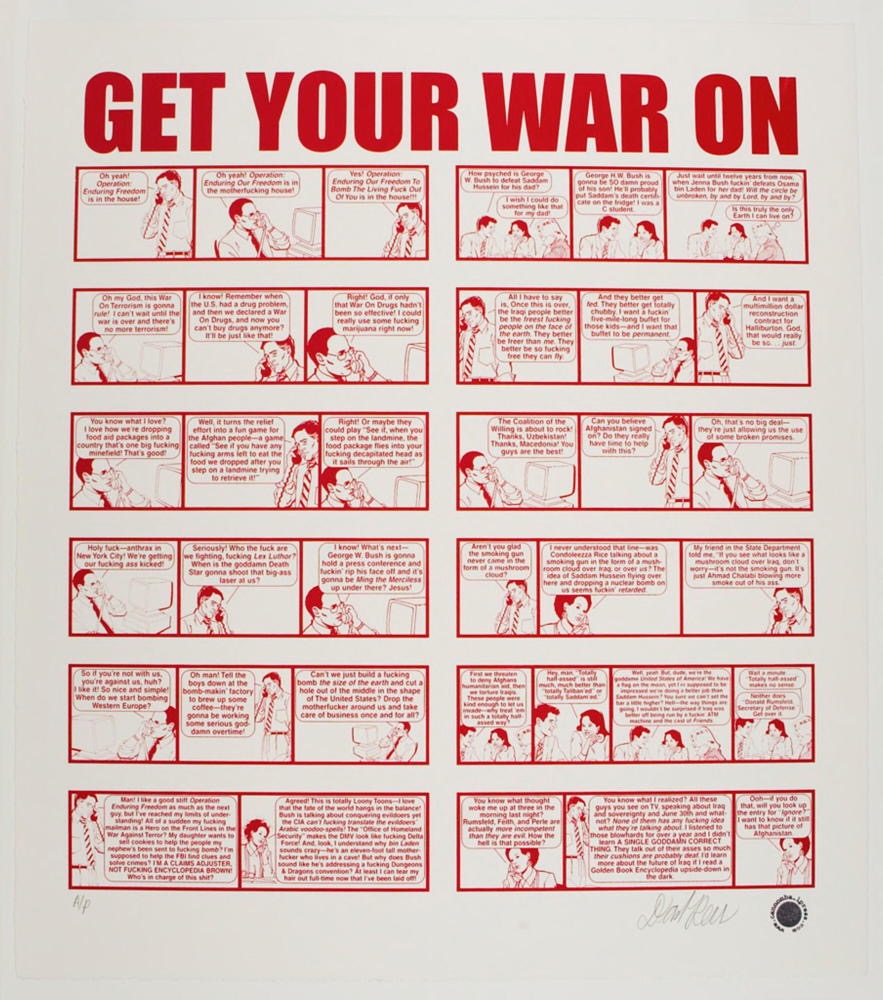
David Rees: Cannonball Press
Get Your War On (2004)
"Aspiring for the impossible never makes it happen."
Eventually, the tin pot dictator's proclamations take on the distinctive scent of irony, irony utterly lost on him, of course, but, increasingly, not lost on almost everyone else. He becomes the parody he always was, finally even in his former partisans' eyes. His plans seem absurdist and not only because they virtually never turn out as announced. Eventually, few, if anybody, can even imagine how they might have ever worked. When the advertised revolution can no longer quite qualify as believable fiction, society widely releases a collective sigh, clear evidence that we can begin GettingOver another sorry chapter.
We have had many sorry chapters to get over in our past.
Grieving

William Holman Hunt: The Triumph of the Innocents (1870-1903)
"They will fail, but they sure enjoy being cruel."
I believe evangelism constitutes a much greater sin than paganism, but then I do not believe paganism qualifies as sin. I believe the separation of church and state has always been a moral issue, as linking church and state constitutes an immoral act. Prayer breakfasts exist so hypocrites can enjoy debasing themselves at public expense. Prayer in schools seems roughly equivalent to enforcing public pooping since it demands public performance of the properly private. I believe the urge to punish debases the punisher much more than it punishes the perpetrator. When I was fifteen years old, I held an after-school job that paid me the equivalent of $21/hour in today's currency. I was able to pay for my books and tuition when I attended university with a small Pell grant and the proceeds of my after-school jobs. I graduated debt-free.
I grieve for a world I failed to appreciate fully, before genuine pieces of shit took office and overran the Republican Party.
CrazyPeople
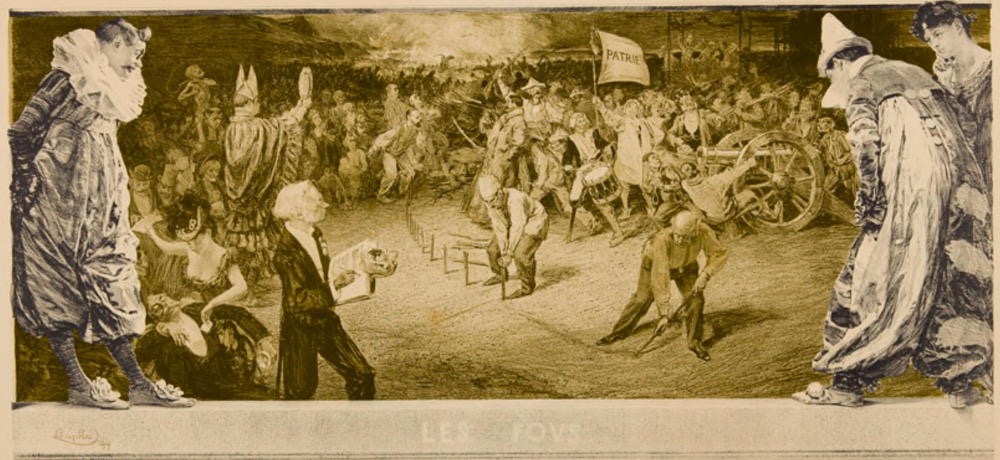
František Kupka: The Crazies (1899)
"They possess only the strangest of strange attractors."
It's never what they do to themselves or to me that bothers me so, but what I tend to do to myself in their presence. It's as if their superpower lies in compromising better angels, defying reason and logic to garble even the worst of intentions. I cannot get my reactions straight. I feel furious before I acknowledge that they cannot help themselves, that that's the crux of their disease. They cannot help themselves, and I cannot help them, either, so I'm rendered helpless. If I didn't care, this couldn't ever hurt me so much, but I can't seem to help but care. Therein lies the whole game, with me competing on both teams. I wrestle with myself, with my own damning demons, while they seem blithely unaware of the calamity surrounding them. If pressed, they always blame the innocent. If charged, they can't help but plead not guilty.
They violate underlying covenants without acknowledgement.
Weekly Writing Summary For The Week Ending 09/04/2025
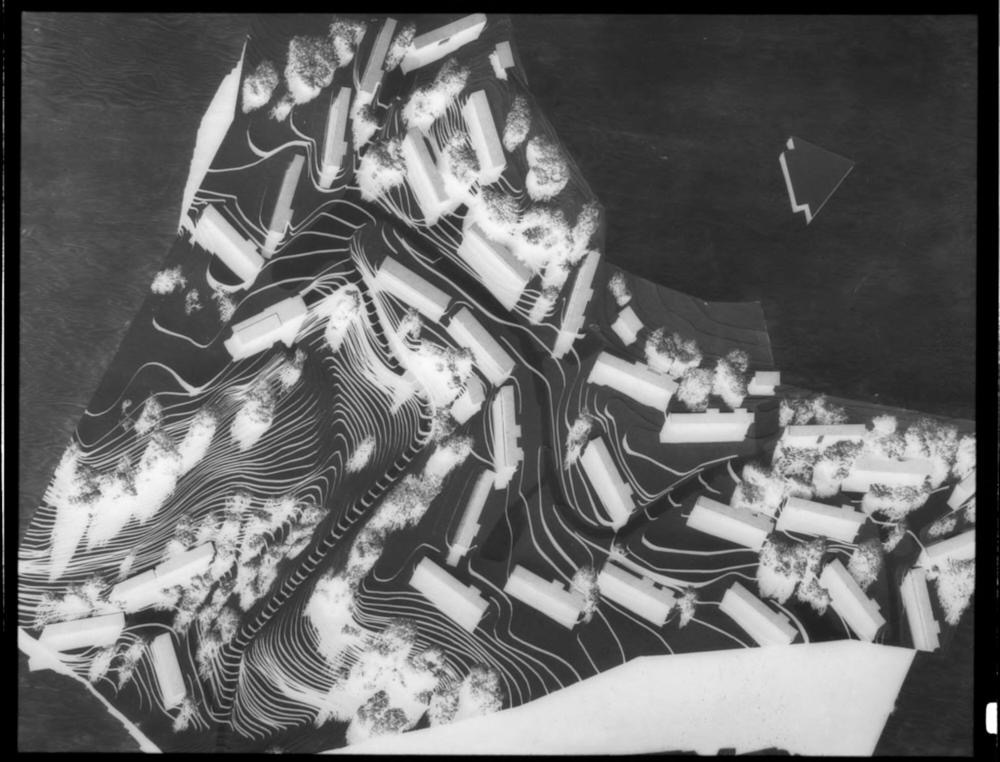
Unidentified Artist (Walter Gropius):
"Aluminum City" Housing, New Kensington, Pennsylvania, 1941-1942
(c. 1942)
Gifted Us With The Experience
One of this week's stories recounted how a U-Haul truck we'd rented broke down, stranding us at a remote truck stop along the Columbia River. It was a hundred degrees as we sat waiting for the rental company to respond to our plight. We overlooked a line of diesel pumps and an ever-shifting set of semi-trucks. Each driver in turn would use a long-handled brush to wash their windshield before pulling their rig forward and shuffling off to the sandwich shop inside. Most were dressed in cargo shorts, a short-sleeved tee shirt, and open-toed crocks, a surprising wardrobe for what I thought would seem like tough truck drivers. They looked like they'd been lounging beside a pool instead of hauling freight along the historic Oregon Trail. The Muse and I shared a pleasant afternoon watching those proceedings, occasionally wandering inside to use the restroom or stretch our legs. I'd passed this truck stop innumerable times over the years without feeling moved to stop and experience the operation. By late afternoon, we heard from a tow truck driver, learning that he'd arrive in another hour. We drove to a little roadside dive for supper. That place, too, I'd passed by for more than fifty years without ever feeling curious enough to stop. Supper was regrettable but edible. We sped home in fading light, arriving just ahead of the tow truck driver, who unloaded the rented box truck and headed out for his three-hour return trip to his garage. Our summer had been missing a breakdown, but we'd never suspected until the universe gifted us with the experience.
SecondOrderStupidity
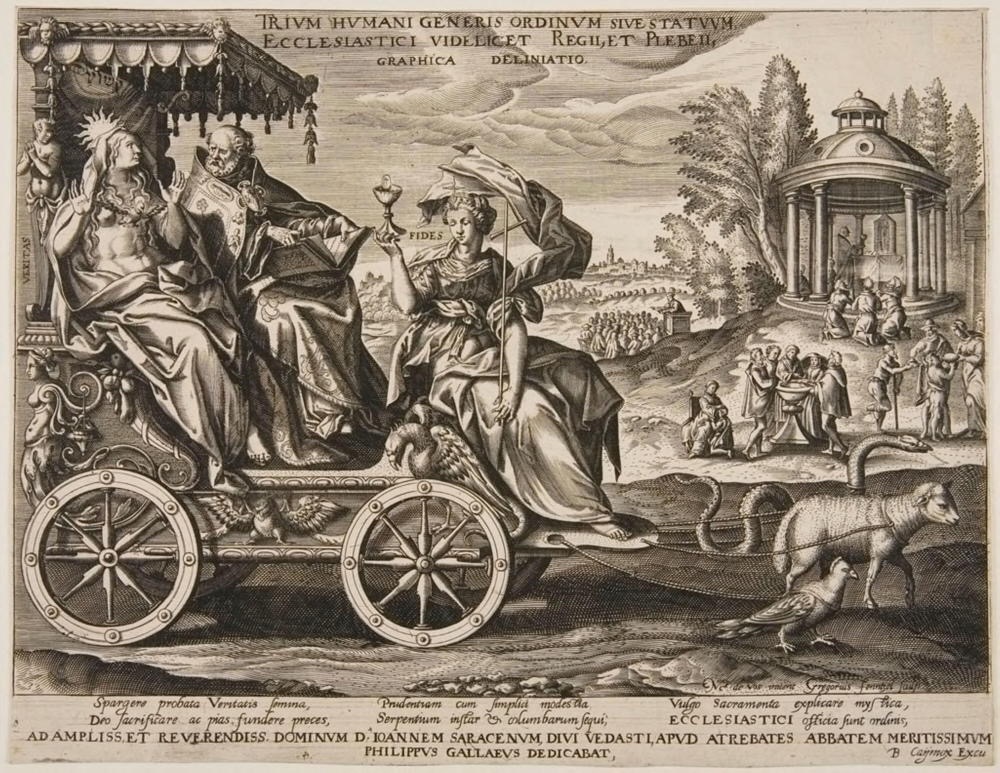
Gregorius Fentzel:* The Three Orders of the Human Race
Alternate Title:
The Combination of Church and State to Govern the People
Series/Book Title: The Triumph of the Four Cardinal Virtues
(17th century)
*[Gregorius Fentzel was a German copperplate engraver active in Nuremberg during the mid-17th century. Few details of his life are known, and his works are primarily based on the designs of other artists, most notably the Flemish painter Maerten de Vos.]
"…acknowledging just how first-order stupid even the brightest of us can seem."
These times exhaust me. Previously, I recall reassurance as a nearly constant reminder that civilization was not crumbling around us. However, nobody needs to go to all the trouble to become a pessimist to experience a continual sense of doom stalking them now. Some insist that this sense comes from a dramatic increase in the sheer number of stupid people. Where we used to produce people capable of brilliance, we now churn out vast numbers for whom even a basic level of competence seems unattainable. Authorities cite increasingly poor performance on standardized tests as prima facie evidence of the cause of our downfall, but I disagree with these questionable authorities, for they seem to suffer from the same disease as their studies' subjects. They exhibit second-order symptoms. In this instance, they exhibit abiding ignorance about their own ignorance. The lens through which they pass judgements seems cloudy beyond their personal embarrassment, rendering them decidedly worse than merely clueless about their condition, but SecondOrderStupid.
The SecondOrderStupid cannot conceive of their own more than obvious-to-everyone-else stupidity.
HaulingAssets
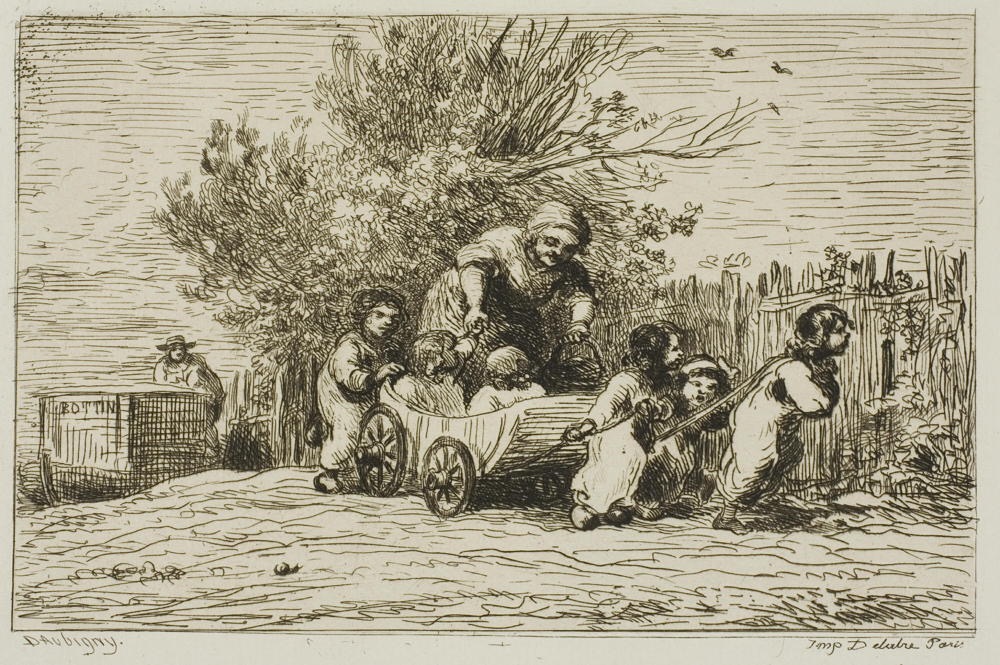
Charles François Daubigny: The Heritage of the Wagon
[The Children with the Wagon] (1861)
"…The Muse isn't certain what she wants to do with the furniture the new treasures will displace."
The pioneer tradition survives with the presence of a thriving wagon-lending industry led by a cleverly-named company: U-Haul. The name suggests that you do your own hauling, much as your post-Civil War ancestors loaded up their meager belongings and hauled their assets the better part of three thousand miles to Oregon. Then, one was expected to use their own wagon. Now, it's possible to rent one for the short duration of a modern migration. Who hasn't been shanghaied into helping someone move something or engaged in some shanghaing themselves? We maintain our treasures the same way we tend to acquire them, by carting them all over creation. I remember the time when my to-be first wife and I were able to easily cram everything we owned into the back of a Volkswagen Squareback Stationwagon. That was the last move either of us ever executed that didn't involve renting some wagon.
Those who rent wagons and vans tend to be the ones least capable of handling them.
Homes

Arthur Rothstein:
Home of Postmaster Brown, Old Rag, Virginia (1935)
"Every past inhabits just such a shadow visible when any prior owner drives past."
For me, home has not always been where my heart lives. It has been a place where I could usually rely on finding a clean pair of underwear and a decent breakfast. I considered most of those Homes, twenty-three by my accounting, safe haven for a spell, if not always necessarily comfortable. They included temporary housing when my life was in transition, and permanent housing that ultimately ended up being temporary. Duration of residence seems to have made little difference in how deeply or whether I permanently imprinted on the least of those places, for I imprinted on each and every one in turn. I must have always been a homebody at heart, a heart each home would eventually wound if not necessarily break. I still consider every place I ever lived "my home," even if I haven't set snoot or foot across its threshold in more than fifty years.
I'm one to want to at least drive by the place, only to not immediately recognize it, what with all the changes it has undergone in my absence.
Bagging
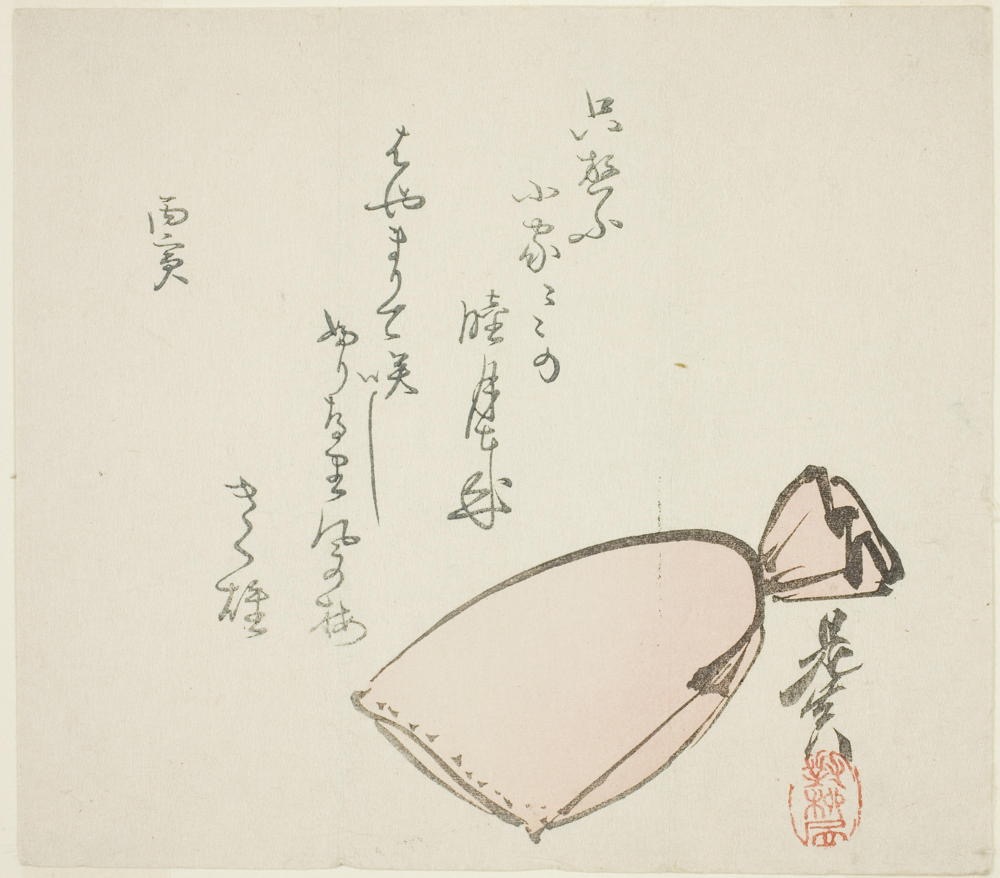
Shibata Zeshin: A bag (1866)
"…the world sure seemed to be her oyster."
I might be most skilled at creating complications for myself. This tendency never seems more present than when one of my grandchildren's birthdays approaches. Then, I feel compelled to live up to a little tradition of my own making, one that complicates what I might otherwise approach as a genuine celebration. (I reliably transform this opportunity into an obligation, and not just any odd old one, either, but a genuinely impossible-to-fulfill one.) Where I might have penned a small, short poem to the celebrant, tradition calls for a full-blown Bag Poem. A Bag Poem typically covers both sides of a paper shopping bag and runs three or four stanzas.
I never know where to start, though I have more than a decade of experience creating these.
Contemplation

Giuseppe Longhi:
Mediterende filosoof [Meditating philosopher] (1776-1831)
Old man (philosopher) sitting in front of the window, in a dark room, with a spiral staircase on the right. The light falls in through an arc-shaped window on his open book. On the right, a servant tending the fire.
"I feel wealthy beyond all reason."
I am contemplative by nature. I spend nearly three-quarters of an hour meditating every day, half in the morning and the balance in the afternoon. I have maintained this routine for more than fifty years, rarely missing a session, for I consider my Contemplation to be my sole competitive advantage, even though my practice never was in any way a competition. (Though I do find the concept of competitive meditation hillarious!) I consider my practice advantageous because I believe it enables me to be, like punctuation enables a coherent sentence to exist. A deliberate stopping for a few minutes seems to pay deep respect for momentum, acknowledging that it never comes from nothing and can be easily over-used if not doled our deliberately. It enables me to be something other than an outlet for kenetic energy, to slow down and perhaps better see the soup I swim through.
I hold the purpose of my Contemplation to be a necessary purposelessness.
ReStart
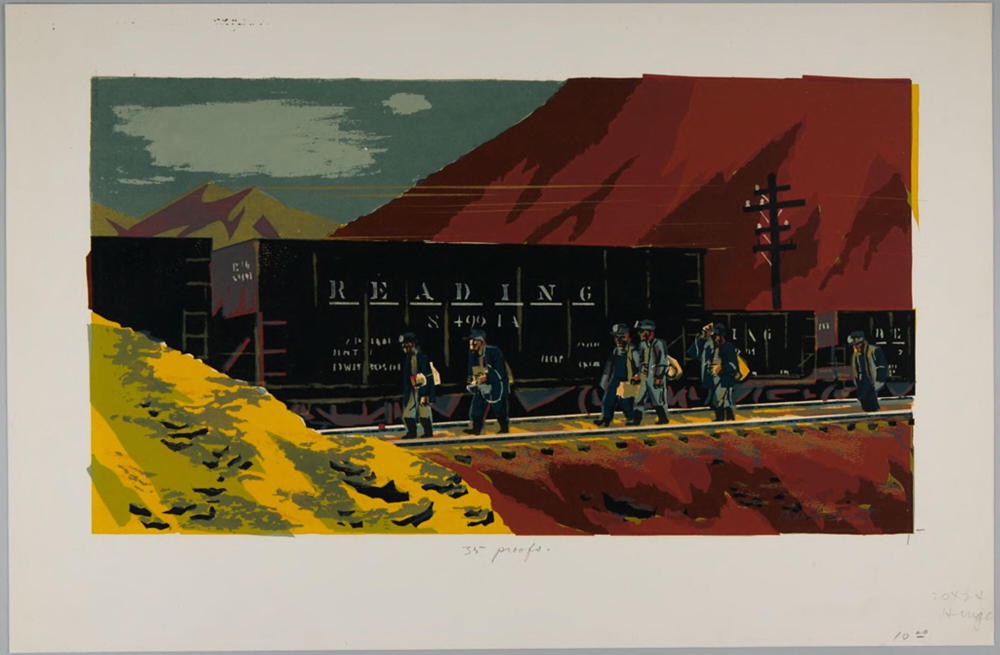
Charles Frederick Keller: Swing Shift (1940)
"I intend to watch."
Our Never-ending Porch Remodeling Project entered a new phase yesterday. In many ways, the effort was ReStart after an extended suspension, though one remote carpenter, our painter, and I had been busy over the summer, even if our chief contractor and carpenter hadn't been. The crew and I had been busy fabricating and painting porch railing pieces, which might not seem like much until you see the detailed design documents. The Muse designed these railings, which represent a melding of key elements from century-old porch railing designs she discovered while researching the history of porch railings. Her design includes passive elements to prevent water from pooling on either the top or bottom rail, as well as elements such as height, which have long fallen out of fashion, if not building codes.
The balusters required twelve separate steps to fabricate, and The Muse decided their spacing, again, based upon her extensive research into the history of baluster placement.
Weekly Writing Summary For The Week Ending 08/28/2025

Claude Monet: The Petite Creuse River (1889)
Decency Insists
I have lost interest in what passes for political news because it no longer contains anything remotely political. It's become spectacle instead, meaningless noise and uproar for the sole purpose of distracting. It has become an enormous distraction. The incumbent will neither become more competent because of it nor less guilty of anything. Yes, he's very likely guilty of everything he's been accused of, just as he always was. The Bill of Particulars already holds enough indictable accusations to impeach him fifty times over. The "geniuses" he hired to administer have steadfastly betrayed their publics. He's run out of criminals to deport, so he's replaced them with innocent citizens. No, he's not dismantling our system; he's only misusing it. The system he seeks to destroy was never as he imagined it. It featured laws and justice and experts, sure, but it depended most upon the decency of the American people, and he’s offended that decency, deeply so. The Third Rail of American Politics was never merely "The Economy, Stupid," but the price of ordinary things. Joe Six-Pack is now a five-packer, heading to four. Two hundred and fifty years ago, decency was measured in tea, and threatening that single ritual resulted in a memorable party given by those who would later be counted as patriots. For want of a cold one, a tyranny might well be lost. Decency insists.
LongHotDry

George Elbert Burr: The Desert (19th-20th century)
"…its presence always seems unreasonable, but only because it is."
The center of my universe sits squarely in desert, though it claims to be a place of many waters. What was once a place of many waters has become a place of contested waters, as competing interests and a historically dry summer have left our river and streams barely trickling. Furthermore, the weather has seemed unrelenting, with very little moisture and extreme heat punishing even the more hopeful gardeners. I water reluctantly. What should be a pleasure becomes toil. What was supposed to be toil becomes all but impossible. It's too hot to even think about going outside some days and far to hot to imagine accomplishing anything out there, anyway.
In here seems little better as closed windows come to feel as confining as jail bars.
Septuagenarian

Lewis Wickes Hine: Untitled [Furman Owens, 12-year-old mill worker,
Augusta, Georgia] (1909, printed 1929)
"…wondering what this Septuagenarian should do for a next adventure."
I have just lately started realizing that I am actually over seventy years old, a genuine Septuagenarian. No job description accompanied this designation, and I could not discern any clear delineation that accompanied the transition into it. I continued as I had seemingly always done, though changes had been steadily encroaching on my habits. A decade ago, before I'd even turned sixty-five, I took no prescribed medications. Sure, my triglycerides were alarmingly high, but I lied to myself that I got a bye because I had inherited the condition, just as if everyone else with it somehow hadn't. I hadn't even experienced cataract surgery back then, as I was still a relative spring chicken. Then I inexplicably began aging.
The cataract surgery began the upward spiral for me.
Third_World

Katsukawa Shunsho 勝川 春章: Man Falling Backward,
Startled by a Woman’s Ghost over a River (c. 1782)
"Did I mention that beer prices have increased by about twenty percent in the last hundred days? "
I wondered what it might be like to live in the Third_World, though I never felt any need to try to experience it. I felt fortunate that I was born in a place and time where I'd not have to cope with those humiliations. I felt no intimation that my nation might one day choose to join the ranks of the steadfastly downwardly mobile, yet here we are, guided by a self-proclaimed billionaire into despair. The price of beer has increased about twenty percent since he took office because he's so ignorant about international trade. He slaps a tariff on aluminum because we use more than our trading partner, this to encourage domestic production of a mineral of which only others have adequate deposits to support an industry. Similar idiocies abound.
Essential services have become optional, often unavailable at any price.
FalsePretenses

Jan Sadeler I: The False Shepherd (c. 1575)
"There never were any other options."
I was reminded again yesterday, while reviewing a justification statement for a USDA Forest Service project in our watershed, how projects tend to start. They virtually never begin with a full disclosure of conditions and intentions, for revealing those details could only confuse what the author hoped might be a straightforward process of receiving approval of their proposal and consequent funding. Anyone might understand that one must pick and choose rather carefully lest too much disclosure encourage an unresolvable mess. Certain aspects of the effort naturally get underplayed, while others become overemphasized. There's rarely any safety in the middle ground, either, for funding authorities require a relatively simple story with clear objectives, heroes, and villains. The result won't precisely be filed under the category of fiction, though it might just as well have been.
Anyone opposing such an initiative always faces numerous potential disqualifications.
BetweenTimes

Ben Shahn: Untitled (Cherry Street, New York City) (1933-1935)
"…napping fitfully."
The Muse and I returned from our latest toodle to enter into BetweenTimes. We sufficiently disrupted the rhythms that ruled our schedules before we left that we could not merely slip back under their influence. The cats distrust us now, with Max the most vocal. He refuses to leave my side, crying whenever I slip into an adjoining room or outside for a minute. He shows up frantic, seeming to plead for my continued presence. Molly shows her displeasure in other ways but also seems flummoxed, though no more flummoxed than The Muse and I seem.
The convenience of being in one place for an extended time seemed most attractive when we were travelling.
Seventy

Sebald Beham:
Moon: plate seven from The Seven Planets with the Zodiacs (1539)
"She will say in ten thousand subtle ways which game we play today."
The Muse turns Seventy today. This long-awaited milestone must mean something and should by all rights be portentous. Seventy has traditionally marked the boundary between middle and ever-encroaching old age, after which, like wearing white dresses after Labor Day, one does not do a whole raft of things, such as wearing Spandex in public. Her time has passed for dalliances. She should be exclusively engaged in serious business, and is and has been. Unlike most who achieve this milestone, The Muse seems to be in the prime of her life and still growing. She certainly seems to be enjoying herself, fulfilling the role of Port Commissioner and taking piano lessons alongside schoolchildren, even performing at public recitals. She still behaves as if she's ageless or timeless or both.
The Muse turns Seventy today, and I find myself at a loss to say anything in any way profound.
Weekly Writing Summary For The Week Ending 08/21/2025

Daniel Hopfer, I: The Bacchanal with a Wine Vat (c. 1515-1530)
All The Usual Plotlines
I claim to live near the center of the universe, overlooking, if not quite inhabiting, it. Leaving never fails to reconvince me just how right this observation seems, for I have yet to encounter a more perfect place, even with all of its obvious blemishes. I reflected this writing week on how I could not have possibly become who and what I am had I been born in any other place or time. The towns we passed through on our toodle to and back from the Midwest clearly showed poorly when compared to where we started, where we knew we were headed at the end of our excursion. In this way, The Muse and I find travel to be enormously reassuring. We are not seeking another new beginning or a second or third-handed fresh start. We know where we belong and feel supremely fortunate for that place to have found us. We returned to find the self-same problems we temporarily abandoned. The sprinklers didn't quite reach as well as we'd assumed they might. Something's fishy about the pond fountain pump. All the usual plotlines reawakened when we crossed our threshold again, thank heavens.
GhostCow

Frederic Remington: The Ghost Dance of 1889–1891,
depicting the Oglala at Pine Ridge Indian Reservation in South Dakota, (1890)
"…May the GhostCow continue bellowing."
As The Muse and I have traveled on this epic toodle, we have been noticing the various states of this still tenuous union. We have found unsettling realities prominently displayed alongside the various myths of our American past. We were much more optimistic a hundred years ago, even more so a hundred and fifty. We built to dreams rather than to spec, and though the bulk of those dreams ultimately crashed and burned, we seem to have learned little from those experiences, other than to venerate our ancestors. We don't believe for a second that we might be capable of epic undertakings, as they did. We don't believe that the majority can succeed, and we hold this belief to be self-evident. We try hard to keep the playing field anything but level just as if our children and grandchildren posed an existential threat to us and our once-hallowed way of life.
Kellogg, Idaho, is the home of the Bunker Hill Mine.
FourMoose
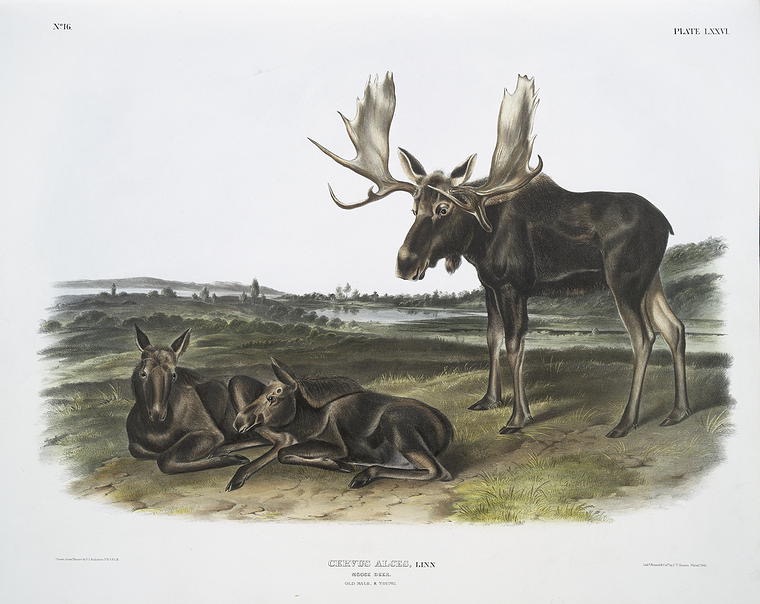
John Woodhouse Audubon:
Servus alces, Moose Deer. Old male & young (1845-48)
From: The viviparous quadrupeds of North America
Rare Book Division, The New York Public Library. "Servus alces, Moose Deer. Old male & young." New York Public Library Digital Collections. Accessed August 20, 2025. https://digitalcollections.nypl.org/items/38998bd0-c6bd-012f-2ebf-58d385a7bc34
"I will remain satisfied having recalibrated the meaning of a truly happy birthday celebration."
My birthday brought a flood of well-wishes exhorting me to have the best birthday ever. (Thanks to each and every sender!) I'm uncertain if it stands in anyone's power to bestow a perfect birthday on anyone, especially themselves, but I took the wishes with the spirit in which they were given and set about doing my level best to celebrate a happy, if not ecstatic, one. It helped that The Muse and I were mid-toodle, not quite halfway home from some serious roaming. Novelty must be one of the better ways to ensure happiness, for discovery seems to be the sole essential element of true joy for me. I've already done every one of the more traditional and predictable sorts of birthday celebrations: cake, ice cream, party, presents. None of these elements seemed very likely to emerge from my context this year.
We were near Devil's Tower, in the Black Hills region of Eastern Wyoming, so we began my birthday celebration by circumnavigating that remarkable edifice.
SeventyFour

The Bighorn Medicine Wheel (2011)
The rock circle is about 80 feet in diameter, with 28 'spokes' radiating from a central cairn, five cairns around the rim, and a sixth slightly outside the perimeter.
US Forest Service photo.
"We dare not ever insist upon sticking to the plan."
On the occasion of my seventy-fourth birthday today, The Muse and I plan to visit the Bighorn Medicine Wheel, a Plains Indian artifact and sacred site located high in Wyoming's Bighorn Mountains, just south of the Montana border. This location could not be less convenient, for it seems well off every well-beaten path. Still, The Muse and I have been wanting to visit this place, and it seems fitting that it becomes the object of my birthday celebration.
We are toodling home from a family function in South Dakota, where The Muse was raised.
OldFolks

Henri Koetser: We Grow Old (c. 1900 - c. 1905)
"Not one of us seems to be getting any younger…"
The Muse has always visited her OldFolks when returning to her home country. Her family took the biblical ‘Be Fruitful and Multiply’ exponentially, so there was never any shortage of OldFolks to visit. When we first connected decades ago, there were more than a dozen surviving aunts and uncles, not to mention innumerable cousins, for each aunt and uncle seemed to have left behind at least five children. The Muse could remember all those kids’ names, in birth order, too, as well as odd anecdotes about each family: where they lived and how. I had an odd uncle and aunt, both my dad's step-siblings from different remarriages, but The Muse had an almost intact history.
She would find her way over to visit them in the way that they would have visited in their time.
FairToMiddling

Ben Shahn: Untitled [county fair, central Ohio] (August 1938)
"…some vestigal and rarely-recognized part of me."
Few institutions better typify rural American civilization than the county fair. It was there when my grandfather was a youth, and it has somehow survived well into this post-truth era, though not in any way intact. In my youth, it was an absolutely must-attend affair, one for which schools closed two days after opening so students could attend the opening on Friday, so-called Kids' Day. The farm kids entered competitions to see who'd raised the handsomest chickens, and we townies would attend with friends to haunt the midway and vomit our obligatory corn dog when riding the Tilt-A-Whirl. Later, we'd meet up with a girl and squire her around the place as if we owned it, which, in some ways, we did. I'd wear a paper Rossilini for Governor visor and feel every bit the fully-fledged responsible citizen.
When The Muse was coming up, she entered sewing projects in her fair and garnered purple ribbons, signifying the best.
Entrancing

Lewis Wickes Hine: Italian Family, Chicago (1910)
"Then the subtle and purposeful passion play commences."
A toodle turns utterly different once the toodlers drop in to visit family. At every other stop, our heroes remain the very soul of themselves: reasonable, mature, and experienced. Drop them into a family context, though, and they take on distinctly different forms. Roles they learned decades before resurrect themselves and start playing out in real time before them. The Muse becomes Aunt Amy, and I can't help but become the long-lost Uncle David. The family members we interact with, too, dutifully assume the roles they learned through iteration when they didn't realize they were learning anything, even though nearly thirty years might have passed since we first studied for our original parts. It almost seems not a moment has passed since that first performance, for there it is playing out right in front of us.
A little (or a lot) of effort might bring the performance to consciousness and allow an actor to intervene authentically, to somehow break the role and be there as they are now, rather than how they learned to be then.
Weekly Writing Summary For The Week Ending 08/14/2025

Benoît-Louis Prévost: Art of Writing, from Encyclopédie (1760)
For Your Interest
I this week made a radical change to my long-established Weekly Writing Summary template. I'd long felt as though I wasn't so much offering a writing summary as an index with which my readers could access the original stories. The summaries, such as they were, didn't summarize very much. This week, while traveling outside my usual box, I experimented with AI, to see if I could appreciate its summarizing ability. I asked it (Grammerly) to summarize one of my stories. I received, after about a second of processing, a crisp and wholly acceptable summary of the story. I was blown away.
I decided to experiment with this facility, wrestling only slightly with the ethical implications of this decision.
Rx

Gordon W. Gahan:
Untitled [Dr. Herman M. Juergens writing prescription] (1965-1968)
"Imagine how fortunate I feel to have been able to barter for a few of those…"
When Roading, the most memorable experiences arise not from planned activities but from inadvertencies: a wrong turn onto a road never intended to be taken, a whim, an obvious mistake. These are the fuel from which the most epic stories emerge and the greatest lessons are taken. If one believes in predestination, it might be easier to insist that some wiser hand guides these, that somebody 'out there' was deliberately teaching you precisely the lesson you most needed exposure to, but these seem more likely random occurrences, with meanings self-imposed, however otherwise profound and unlikely they might seem.
A single degree change in intended trajectory results in a dramatically different destination.
Roading

Hall Thorpe: Home (c. 1919)
"Life continues even when the protagonists are off Roading."
Traveling demands a different governing ethic than home ever does. At home, a certain level of control seems possible that traveling renders unlikely. Different comforts satisfy there, too, with novelty and unfamiliarity replacing comforting routine and predictability. For sure, I find traveling enticing, so much so that I have grown to avoid its seduction, insisting that I have pressing business keeping me in my place at home. I contend that I've found my center, and leaving throws me off that balance. I even feign pressing business that might otherwise remain easily deferrable, attempting to deflect the old seduction Roading resurrects. I was once what might have passed as a road warrior, so familiar with airplane schedules that I never had to look them up, gone more than I ever came back.
As with most seductions, I eventually awakened from that dream, however enticing it continued to seem.
HistoryLesson

Arthur Rothstein: Street in Butte, Montana (1939)
Farm Security Administration Photographs
The Miriam and Ira D. Wallach Division of Art, Prints and Photographs: Photography Collection, The New York Public Library. "Street in Butte, Montana" The New York Public Library Digital Collections. https://digitalcollections.nypl.org/items/32c50bd0-059b-0138-0ab0-4f25bfb71a96
—
"…he very best portrait of our American Dream, and one hell of a HistoryLesson."
The history of the American West comes deeply steeped in myth, though even deeper truths become apparent with any visit. This remains a rough and relatively wild place, with poverty its most obvious characteristic. Small towns tend toward something other than the idyllic. The few cities seem displaced and still largely experimental. The highways connecting places seem mostly empty and in need of considerable repair. The scenery remains breath-taking, even daunting. Those who live there still struggle to survive, let alone thrive, for the economy remains securely stuck in some prior century the inhabitants seem quick to defend. HistoryLessons seem perhaps more apparent to visitors than to residents, who have been the serial victims of many previous attempts to prosper.
Relatively desperate people settled the American West, people fleeing almost certain ruin on the prospect that they might get lucky, or luckier than their birthright alone proved.
DerelictBarns

Claes Jansz Visscher: A Barn, from Landscapes
[Verscheyden aerdige Lanthuysen…] (1620)
"…as our history continues disappearing around us."
I worry some about what will become of the DerelictBarns I have known through my life, for I have grown to rely upon them, and I fear my grandchildren and great-grandchildren might never know they existed. Nobody seems to be building new cathedrals to their critters and hay. Most farmers opt for aluminum pole buildings these days. Back in the day, by which I refer to times long before mine, self-respecting farmers might erect a barn intended to weather the ages, massive edifices with stone foundations and fluted roofs. These proclaimed a deep faith in the future and self-esteem the likes of which seem ever rarer these days.
For me, a townie, DerelictBarns held history that utterly fascinated me.
On_Liberty

Irving S. Underhill (possibly): Statue of Liberty, New York (c. 1928)
"…to never be the same again. Period."
I woke this morning to find myself temporarily off my usual duty. In Navy parlance, this state renders me On_Liberty. I haven't mustered out, and I still retain my responsibilities, though they have been suspended for a limited time so that I might pursue other interests. Somebody else fed my cats last night, a daily responsibility I take most seriously, and they also fed my pond fish. The Muse rigged up water timers and sprinklers to accomplish what I would usually take full responsibility for fulfilling. I left Kurt, our painter, in charge of the never-ending porch refurbishment, and Linda Sue, our longtime friend and house cleaner, in charge of the house. I did not begin yesterday evening crouching around picking up over-ripe apricots I couldn't reach when harvesting that had finally given up and smashed themselves on the driveway. I didn't even cook my own supper, for I was On_Liberty.
My nephew, who served a stint in the Navy, though I didn't, explained to me that most seamen waste what little liberty they get.
Unaiming

Hans Thoma: The Wanderer [Der Wanderer] (1903)
"I will not have heard the news because I wouldn't have been listening for it."
I had become too focused, too purposeful, and so had The Muse, whose role as Port Commissioner often seemed all-consuming. We'd start our days by syncing schedules and end them with a late supper. I would rise ever earlier, and she'd come to bed seemingly ever-later, sometimes not quite asleep yet when my alarm was going off. Life can become all-consuming, more obligatory and predatory than freeing and renewing; hamster wheels with vaunted purposes; debts incurred solely to achieve leverage.
We went around and around to reach an agreement on the terms of our disengagement, for engagement had become addictive, enlarging responsibilities into imperatives.
Weekly Writing Summary For The Week Ending 08/07/2025
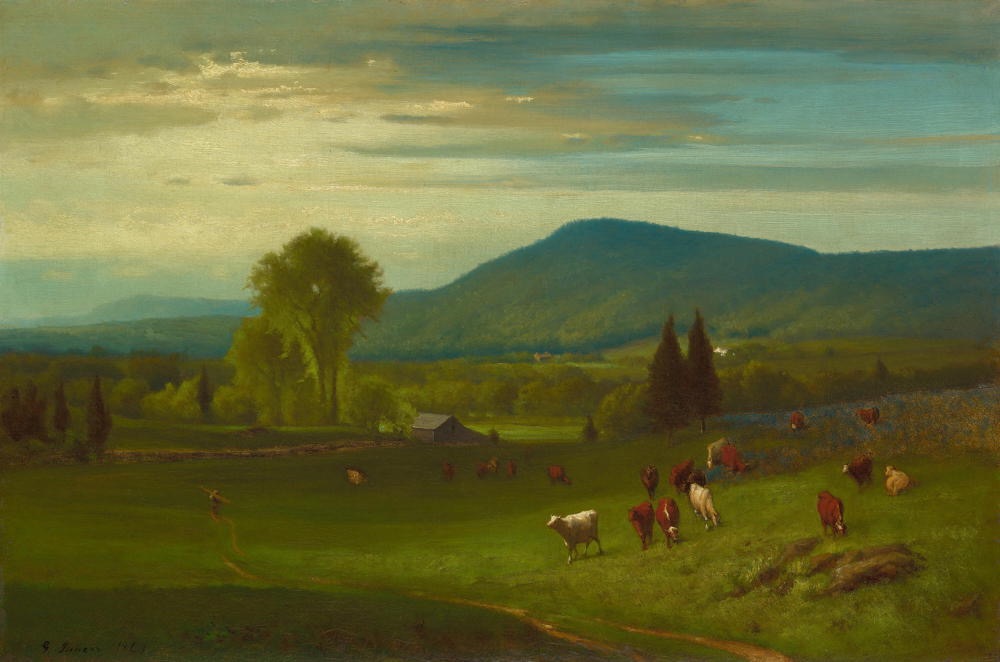
George Inness: Summer in the Catskills (1867)
Aching To Feel Aimless Again
Each day seems to bring another insult, a fresh example of waste, fraud, and/or abuse. Our incumbent has amply proven himself to be a first-class nincompoop who cannot seem to act according to his own oath of office. He possesses no honor, class, or intelligence. He seems to believe he's above accountability. I keep adding fresh items to his eventual Bill of Particulars, the list of grievous offenses he will one day be charged with when he's finally impeached. He's such a delicate damned flower, unable to handle the truth about anything. He and his minions have created a fictional administration Hell-bent on undermining civilization in favor of a Confederacy of absolute dunces. I bring up all these obvious points that don't really need recounting to admit that I'm weary of it. It doesn't seem like drama. I cannot seem to suspend my gape-mouthed disbelief when each previously unimaginable insult to my morals and my intelligence appears on another front page. I'm suffering from some degree of depression, if only because these days seem so doggone depressive. My optimism often calls in sick. My usual enthusiasm wants a nap. My digestive system barks at me about whatever I consume. I need a change of venue. I've been daydreaming of visiting France and Italy, where sunny days nudged us to ramble aimlessly and fruitfully. I ache to feel aimless again. Over the next two weeks, the Muse and I will be toodling. I will be checking in from presently unknowable locations.
PreppingForEternity
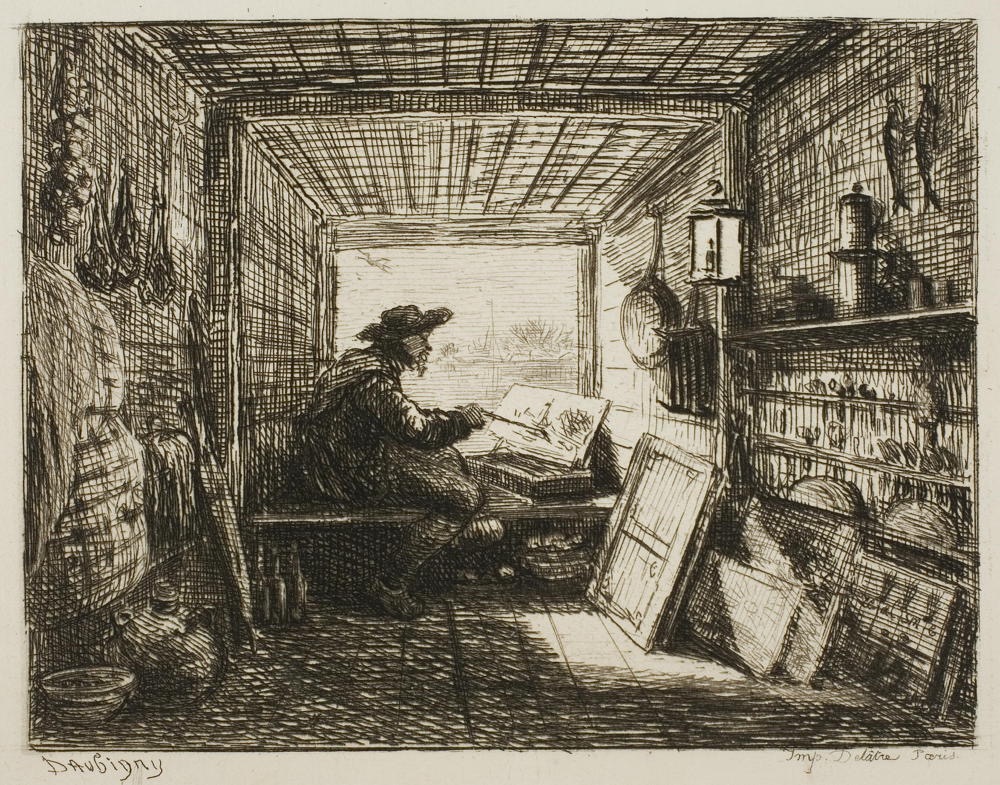
Charles François Daubigny: The Boat Studio, from The Boat Trip (1861)
ABOUT THIS ARTWORK
In order to paint the river landscape scenes that accorded so well with his temperament and taste, Daubigny decided to build a floating studio that could be positioned to afford the best points of view and to capture the varied effects of natural light. The etchings that resulted in the series “The Boat Trip” are an early example of the plein-air aesthetic, a practice of working outdoors that the Impressionists would wholeheartedly embrace.
——
"I'll just witness the final installation."
Even the idea of being away from The Villa for more than a week unsettles me. The Muse wisely suggests we refer to it as a road trip rather than as a vacation, and to the extent that such a second-order reframing soothes me, this works! I will not undertake this excursion as if it were a reward for diligently working, but as a much more pedestrian toodle a little further afield than usual. To maintain this illusion, we plan to avoid driving on freeways. The Muse was raised just south of US Highway 12 in NE South Dakota. I was raised just south of the same highway in SE Washington State. Between these two locations lies what now amounts to an ancient route across Montana and South Dakota, one trucks abandoned in favor of the Interstates. Twelve hundred and fifty miles of two-lane blacktop: small towns, scenery, and, with luck, some sanity.
Preparing to leave remains a challenge.
UnderGawd
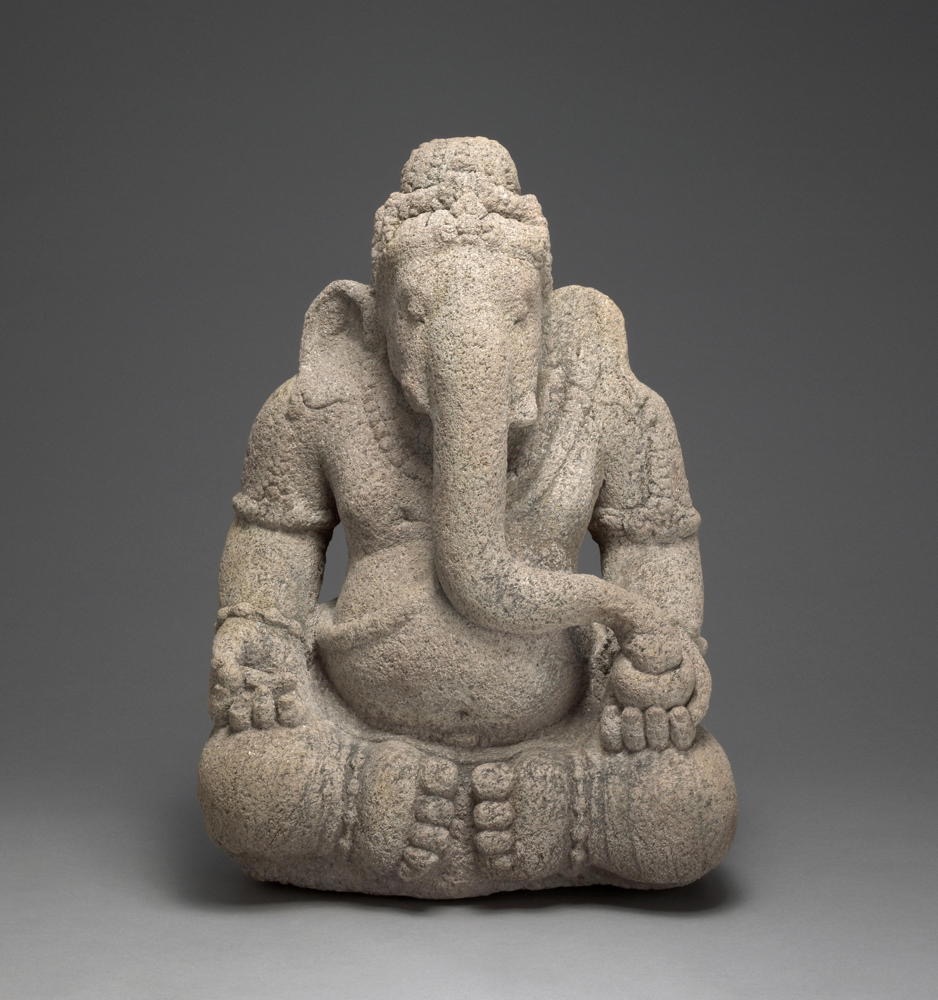
Unknown Indonesian artist from Central Java:
God Ganesha, Remover of Obstacles (9th/10th century)
"…no enforcement mechanism other than the usual tacit coercion has yet been codified into statute. Yet."
Perhaps the definitive element of American citizenship lies in its relationship to God. (I've thoughtfully included a picture of a prominent god above, the Hindu god Ganesha, Remover of Obstacles so that we can share a visual example of a prominent god.) "Real" Americans believe themselves to operate "Under God," as stated in the amended Pledge of Allegiance to our flag. The author of the pledge originally proposed it as an antidote to the influence of immigration from Southern Europe, which was popularly believed to be threatening to dilute genuine American values. He intended schoolchildren to recite it, and it contained no mention of God.
The Federal Government standardized the pledge during WWII, but it still held no reference to God.
MsCommunication
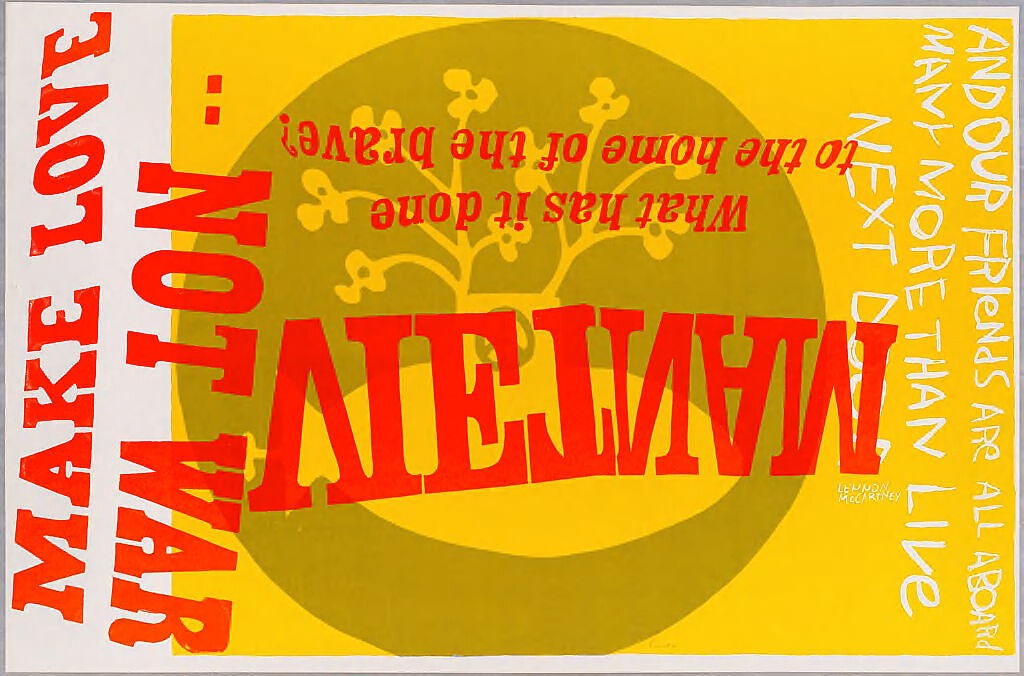
Corita Kent (Sister Mary Corita): yellow submarine (1967)
Inscriptions and Marks
Signed: l.c. in black ink (ball point): Corita
inscription: Printed quote reads: MAKE LOVE NOT WAR / VIETNAM / What has it done to the home of the brave? AND OUR FRIENDS ARE ALL ABOARD MANY MORE THAN LIVE NEXT DOOR Lennon McCartney
-Harvard Art Museums/Fogg Museum, Margaret Fisher Fund
-© Courtesy of the Corita Art Center, Immaculate Heart Community, Los Angeles / Artists Rights Society (ARS), New York
"Vacation is the final stage of denial."
Anyone who has attempted to commit a long-term relationship can attest to an occasional communication problem made more difficult by the anesthesia relationships induce. After a decade or two, even the more self-aware seem likely to persuade themselves that they understand what they could never understand. Long proximity bestows no immunity against misunderstanding. It might even render those infrequent occurrences just that much more insidious. The watchman dozes. One might even convince oneself that one can disclose anything without fear of offending, that one's partner represents a bottomless well of understanding. This could never have been the case, though, for regardless of the length or depth of a relationship, the partners remain different people and prone to the occasional bout of serious MsCommunication.
I was never one to subscribe to the notion that women are from Venus and men hail from Mars, though I suspect that gender might engender different perspectives.
DisappointingMyself

Caesar Boëtius van Everdingen: Pan and Syrinx (c. 1644 - c. 1652)
Gallewry Notes:
The nymph Syrinx is on the run, with the forest god Pan, hidden among the dense vegetation, in hot pursuit. Van Everdingen captures the dramatic moment of the metamorphosis as Syrinx implores the river nymphs for help. They transform her into water reeds. Her right foot is already turning green. Disappointed, Pan listens to the wind playing through the tall reeds and subsequently cuts his flute from them.
"…knowing for sure only that I was DissapointingMyself again."
I am perhaps most skilled at DisappointingMyself. Oh, believe me, I remain fully capable of disappointing everyone else, but without intending to disclose even the tiniest bit of personal narcissism, I seem to be most skilled at DisappointingMyself. When I disappoint others, I first DissapointMyself. I hold myself to unrealistic standards, refusing to adjust my metrics to emerging conditions. I hold ideals more than I ever hold ideas. I frequently fail to uphold those ideals in practice. I can't seem to visualize modest ideals. What might they entail? How might I wean myself of my loftier aspirations? On my better days, I seem capable of accepting that I'm only human; on some days, barely so. Even when I set what seem like reasonable goals, I fail to achieve them.
As with any experience, coping's the essence.
Dedicated
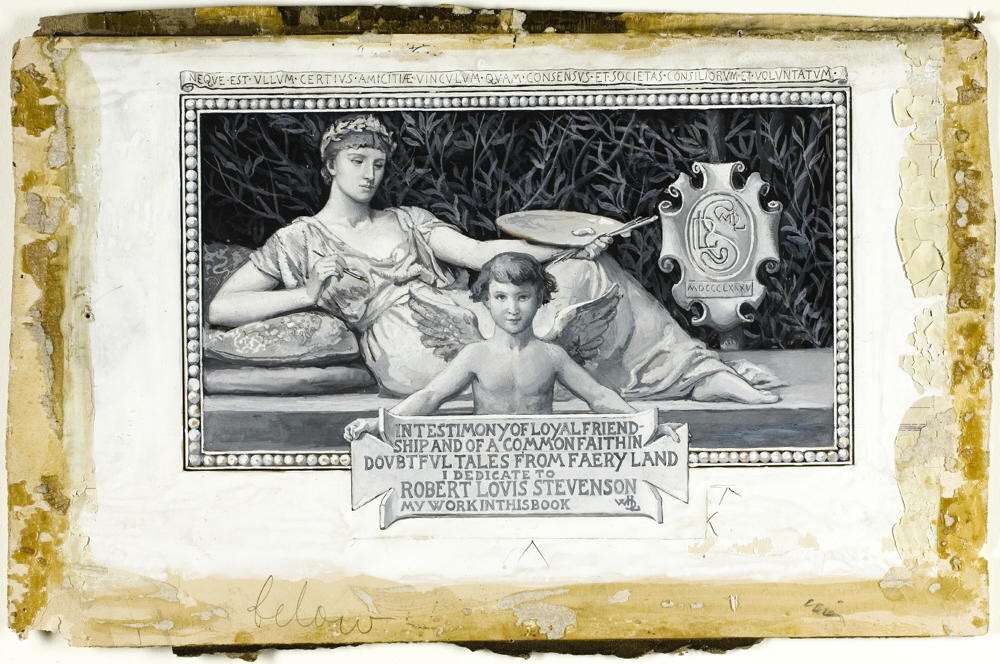
Will Hicock Low: Dedication [for Lamia] (1885)
"It's unlikely to kill me now, either."
Much of the work you and I engage in fails to feel all that engaging. Much of it seems mind-numbing if not necessarily self-destructive. I realize, now that realizing no longer matters, what my father was doing when he insisted I mow more lawn than any eight-year-old should ever mow or rake more leaves than I ever believed I could. He was teaching me how to become Dedicated to some outcome. He'd come up the hard way, in a broken home during the Great Depression, and he had learned from a stern grandfather and a nurturing mother, as well as from a ne'er-do-well counterexample of a dad, how to set aside his feelings to accomplish something or not. He told many tales of working in harvest: how hop vines raised welts on his forearms, how green beans fill up a sack too slowly, how he'd shown up early in the morning and worked through midday. These were object lessons intended to inform me about how this world works.
He was an inspiration.
Jaded
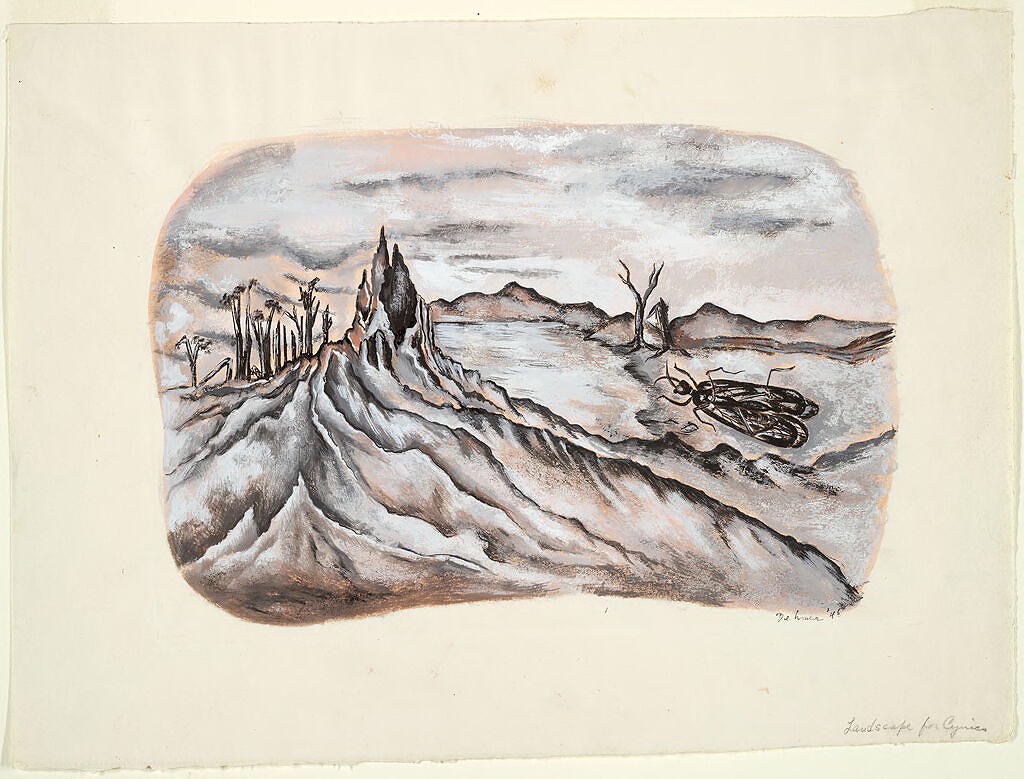
Dorothy Dehner: Landscape for Cynics (1945)
Harvard Art Museums/Fogg Museum,
Gift of the Dorothy Dehner Foundation for the Visual Arts
© Dorothy Dehner Foundation for the Visual Arts
"…why they're so confidently leading us into Hell."
We inhabit a time seemingly tailor-made for cynics. The individuals who comprise our administration, who never intended to administer anything, lead the way by steadfastly failing to fulfill the obligations they agreed to when taking their oaths of office. They tend to do the opposite of whatever they promise. The incumbent confuses confabulation with communication. His supporters insist that we should take him seriously, but never literally, whatever that's supposed to mean. The party that long advertised themselves as The Party of Lincoln, family values, and economic conservatism behaves like confederates, pedophiles, and economic ignoramuses in practice. My congressional representative makes no bones about who he believes he's representing, and it's not his constituents, whose interests he's betrayed at every opportunity.
I was no innocent.
Weekly Writing Summary For The Week Ending 07/31/2025
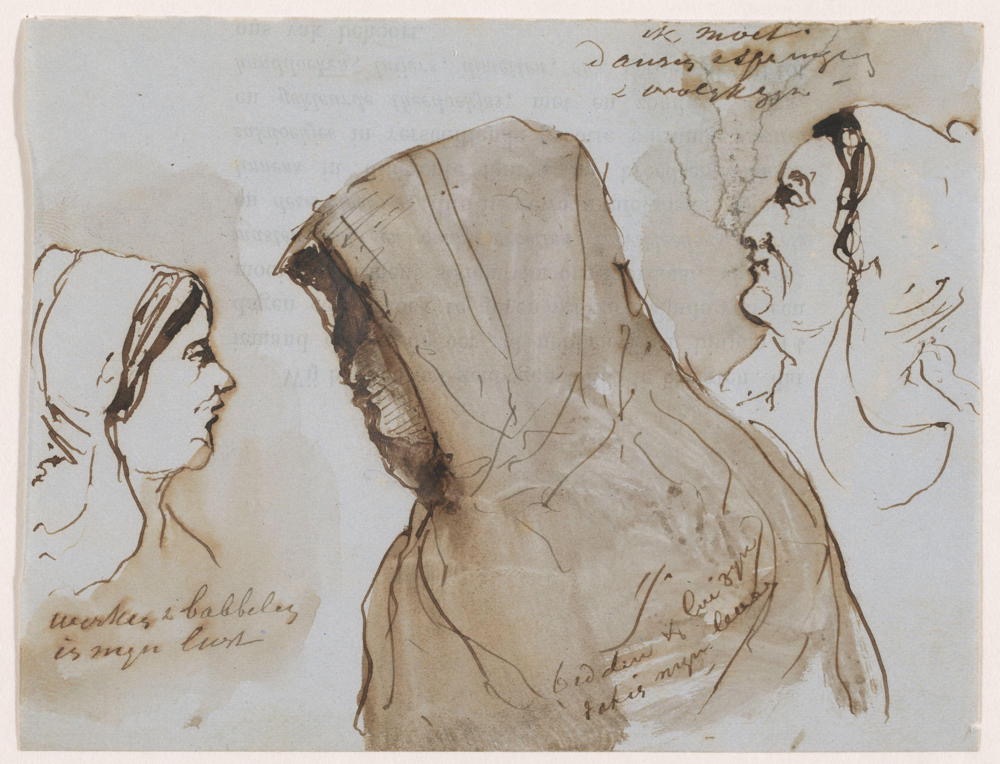
Johannes Tavenraat: Twee vrouwen en een persoon met capuchon
[Two women and a person with a hood] (1840 - 1880)
So It Seems To Go
When my father was in his mid-fifties, he took early retirement from the Post Office because he could afford to. He retired not to a life of leisure but one featuring different kinds of work, for he had always been a working man and would get uncomfortable if he had too much time on his hands. He reserved time to watch his beloved Mariners, Yankees, and Dodgers, and to read his books, but he also had a large yard to care for, as well as a few rentals that always seemed to require his attention. Preparing to be out of town, he pushed himself even harder than usual so that when he showed up at my home in Portland, he was experiencing shooting pains down one arm and extreme tiredness. I ferried him over to Providence, where they decided to admit him. He was in the ICU for the following week and in that hospital for the next ten days. He was released to recover from his heart attack, not at home, but at my place, where he and my mom were welcome for as long as his recovery took. He was exceedingly weak, unable to even sit up for more than a few minutes at first. It was humbling to see this man, who had always been so physically commanding, so disabled. He never even thought of smoking another cigarette again, and claimed to have never missed them. My mom learned to drive their huge Chrysler around narrow Portland streets, and even, after an excruciating few more weeks, drove it the 245 miles home with him riding shotgun, a first in their long relationship. Everything was different after that.
I remain aware that I live in a time in my life when a single event could result in nothing in my life ever being the same again.
Haven
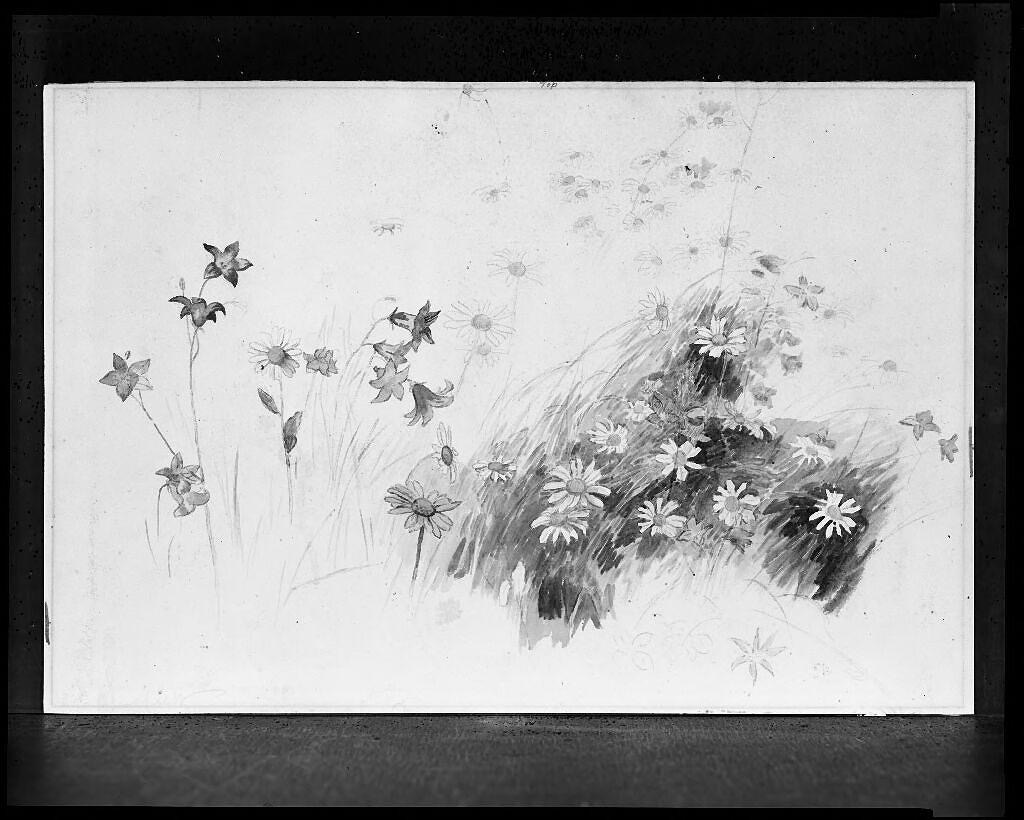
John McWhirter: Study of Wildflowers (19th-20th century)
"No camera could have captured what we witnessed there…"
The Muse and I feel fortunate to live off the better beaten paths. Despite the difficulties we experience trying to find a decent loaf of bread here, many subtle positive externalities surround us. At our age, this place, this “valley they liked so well they named it twice,” its scale suits us even if the politics and parochial perspectives don't always please. Many of our age have relocated here, imagining a safe haven within which to age, only to find healthcare difficult to access and often unavailable at any price. Furthermore, for those accustomed to the narrow range of weather found west of the Cascades, our climate can prove tiring, with endless weeks of temperatures in the nineties throughout summer and months of dreary fog accompanying each winter. Water seems as scarce as Trader Joeses, Costcos, and Targets. Lately, several old familiar businesses have closed. Our economy suddenly seems to be on a downward spiral.
The compensations sometimes seem few and far between, for they remain subtle.
TooOld
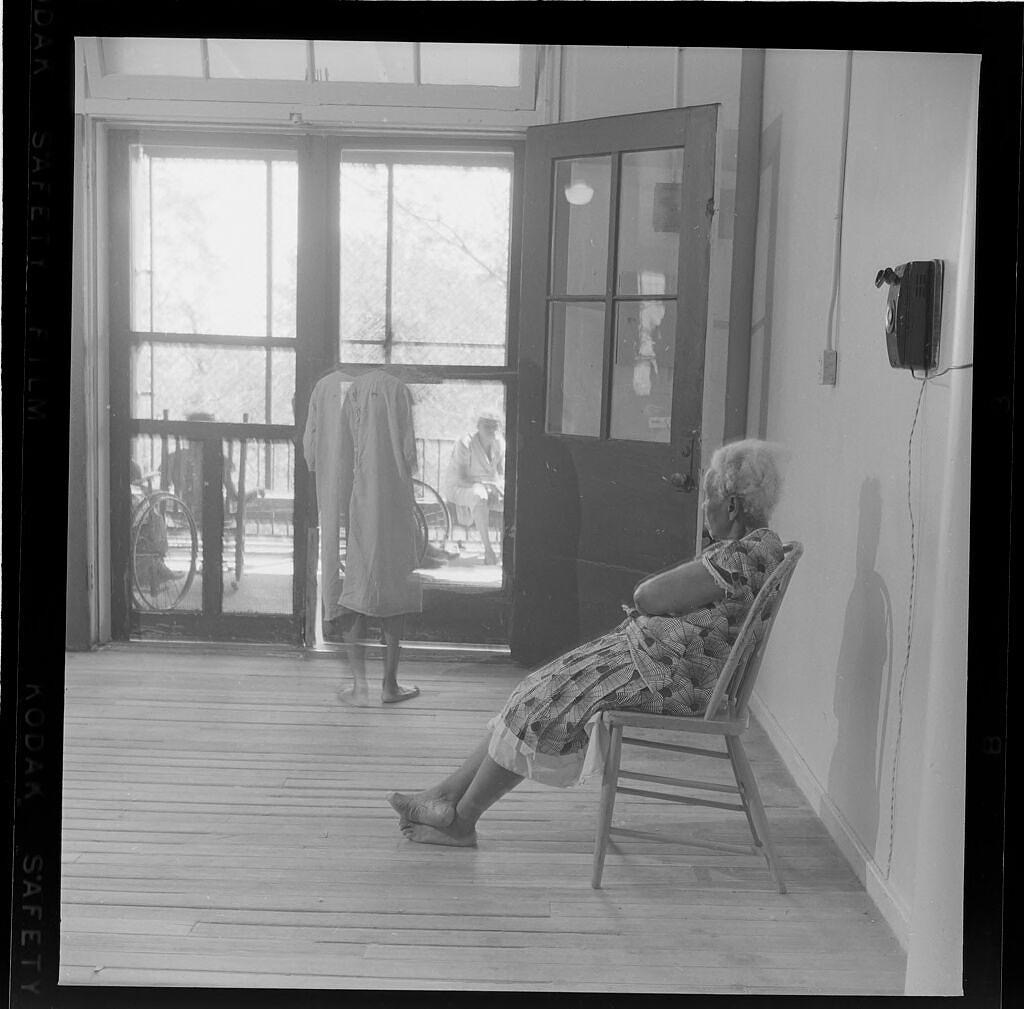
Jack Gould: Untitled [elderly women inside old house] (c. 1950)
" …when I was still considered too young to engage in any of this shit."
For most of my most formative years, I was too young. I excruciatingly slowly outgrew my youth to eventually qualify for many of the activities from which my youth had excluded me. I was granted certain dispensations. I was granted the opportunity to ride my bike six miles uphill every predawn morning, delivering newspapers, when I wasn't quite ten yet. This was because my year-older brother was also vying for a route, and mine would make one less drop for the distributor every morning. Once I began getting granted opportunities from which my youth had early exempted me, I began to appreciate the even then ancient adage cautioning against being extremely careful about what I might wish for. I was proud to have a paper route before I was allowed to have one, but then I was expected to pull my weight as if I had already turned ten.
Being old enough didn't provide the payoff I had anticipated.
Expectations

Rembrandt Harmenszoon van Rijn: Beggar Man and Woman behind a Bank (1630)
"Should this realization motivate me to stop engaging?"
I was never able to buy into the once-popular notion of continuous improvement. For me, that concept set utterly unrealistic Expectations because improvement, as well as most other phenomena, never occurs continuously. Intermittent might better describe improvement processes, if 'process' even qualifies as the proper descriptor. Some insisted that the continuous label was affixed for motivational purposes, though this insistence nudged me even closer toward disgust. I was never all that motivated to experience the impossible. How, I wondered, would setting impossible Expectations motivate anybody? Those seemed to create good reasons to not feel motivated, but despondent, and put-upon by whoever presumed the right to expect me to produce impossibilities.
So, I early on imprinted on the absurdity underlying much of what we label as process.
Golf(Reprint from 2/24/2025)

Jack Gould: Untitled
[woman wearing dice costume playing golf] (c. 1950)
"He's absent without leave or purpose. This might be his greatest gift to us."
(This story is a report from 2/24/2025)
Golf represents one very prominent feature of NextWorld. I might be tempted to insist that our Incumbent sought the job for the leisure time it provided, for, despite being one of the Quote, Busiest people in the world, Unquote, he somehow manages to spend three or four days each week at one of his golf courses, playing or playing at golf. I might also be tempted to consider this proclivity evidence of more than an idle interest, perhaps an addiction, for few activities more demean high office than time spent on "the links." The game represents the pinnacle of what economist Thorsten Veblen called Conspicuous Consumption. Veblen lost a series of university appointments because he insisted upon writing unpopular analyses of the world he inhabited. He possessed the temerity to propose that the apparent purpose of success in America was to essentially waste the resulting wealth showing off. Few human activities seem more frivolous than owning clubs dedicated to offering well-heeled opportunities to fritter away hours chasing a small ball around a park. Indeed, the most frivolous possible activities involve throwing away irreplaceable time.
Kurt Vonnegut believed that the true purpose of human existence involves farting around.
Depth
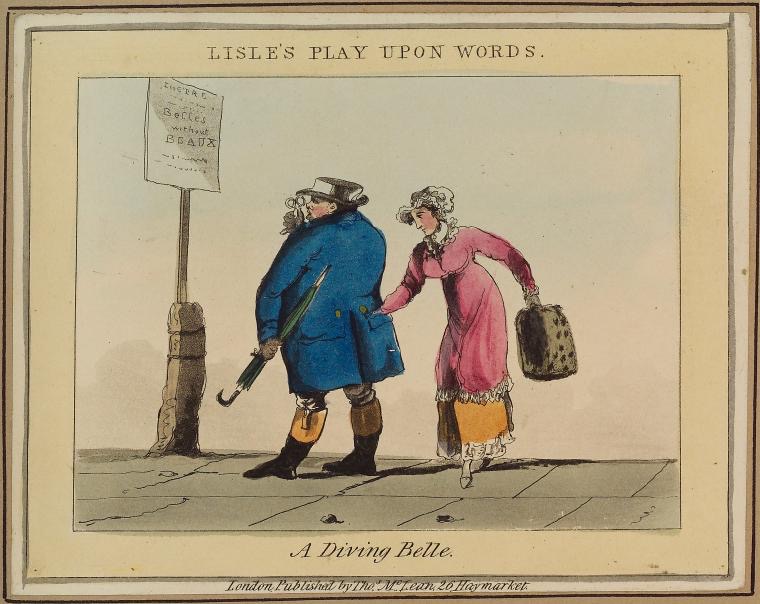
Joseph Lisle: A diving belle (1818 - 1830)
From the Thomas McLean Collection
" … the last thing they will have to celebrate until their own assassination."
I have been operating out of my Depth for all of my life so far. I once believed—or prayed—that I might one day "grow out of" my innate shallowness, though I no longer hold out much of any hope for that result. I have grown to expect myself to perform pretty much to my specs, which, while sometimes broad rather than narrow and tall rather than short, have always, so far, tended toward the eminently shallow. I'm uncertain how one develops Depth. Experience alone does not necessarily seem to translate into deepening experience, for one can seemingly dabble in any subject without ever truly delving very much deeper.
Many have taken to complaining about the lack of Depth in our incumbent's political appointees.
A_Lot

Anonymous Germany 1499:
Lot's Wife Turned to a Pillar of Salt (15th century)
"We know he's lying whenever he moves his lips."
Our incumbent, who works hard to emphasize that he never was or will be "Our President," employs a particularly telling "tell." A "tell" describes an unconscious action that betrays an attempted deception. In other words, a tell provides explicit confirmation that he is lying when he lies. He seems to continually employ this specific tactic, which serves to bolster the notion that he rarely tells the truth. He will make some assertion and immediately confirm its accuracy by declaring that "A_Lot" of people agree. Validation by reference to some vague quantity rarely convinces anybody. "A_Lot" could be a dozen or a thousand or a million. He leaves the precise volume to his listener's imagination. He appears to use his title to amplify his assertions, as if holding an office bestowed special perceptive powers on the office holder, when it clearly doesn't. He might be attempting to intimidate opposition by anchoring his assertion, however absurd, to some imaginary majority opinion, as if merely holding an opinion or just being said to hold an opinion might render any odd assertion valid.
In his ecosystem, bare assertion seems to often stand in for naked truth.
Weekly Writing Summary For The Week Ending 07/24/2025
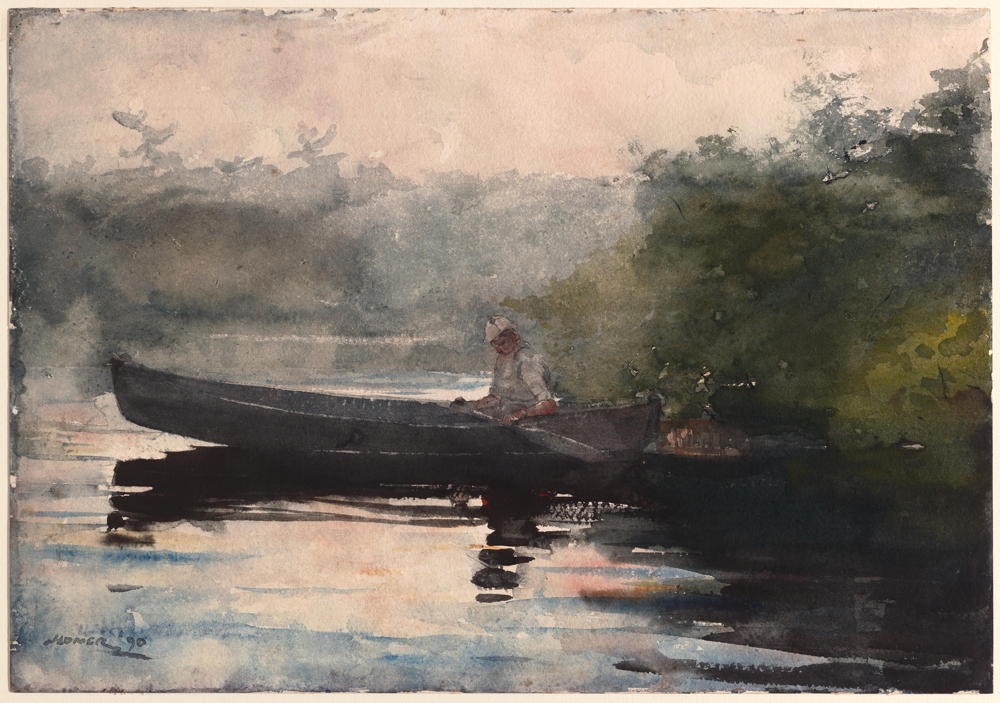
Winslow Homer: The End of the Day, Adirondacks (1890)
Notice Themselves Disappearing
It's fundamentally unfair that shame has been so haphazardly distributed among the populace. Most quickly redden when catching themselves engaged in something embarrassing. Some seem to possess no threshold beyond which they can consider ceasing or desisting, even though accomplishing either amounts to doing both. Our incumbent, may his name never again cross my lips, knows no limits. He serves as a continual reminder of the price of self-importance, for it inflicts by far the greatest tax on everyone else. Those who witness it in action never recover whatever respect they might have previously exhibited toward the afflicted. Those incapable of shame ultimately seem inhuman.
This universe never had any masters.
Indenture
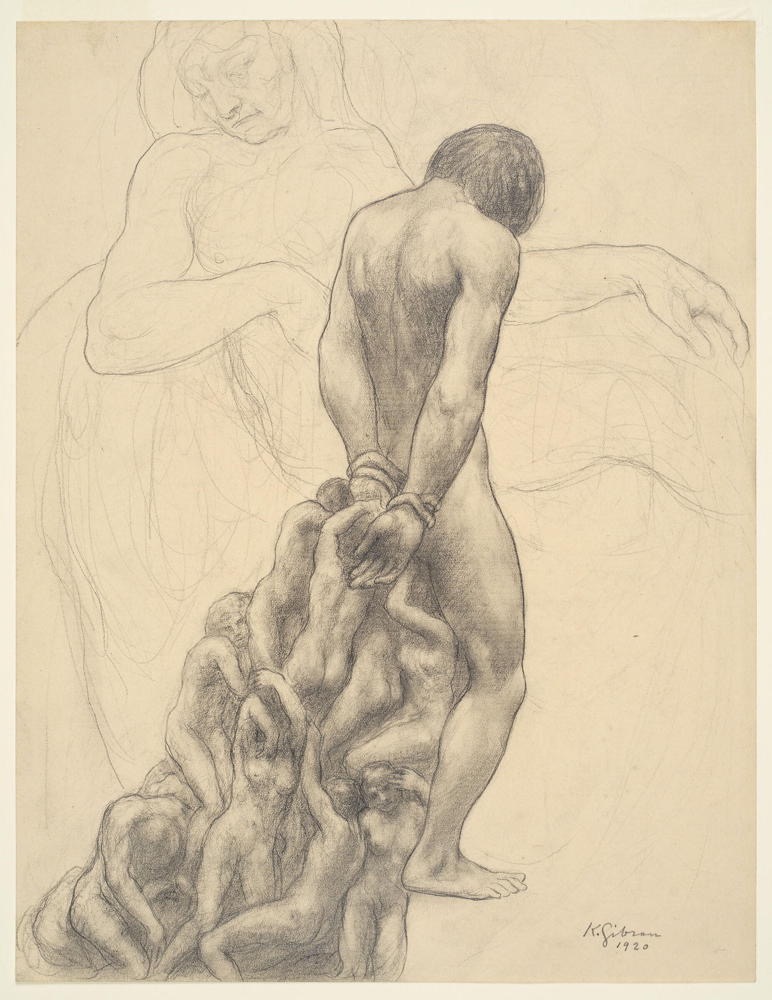
Kahlil Gibran: The Slave (1920)
"I have another early call again tomorrow morning."
Part of the sacred responsibility that accompanies any family must be the obligation to occasionally Indenture one's spouse. This need not necessarily be in any way ominous, for necessity will dictate the timing. Part of the unwritten covenant between any couple covers cornering them. This might involve volunteering their services without first consulting them or merely informing them, rather than asking. The savvy spouse will accept these assignments without altogether too much grousing because they at least imply that they're still seen as good for something, which might be a blessing, depending.
The Muse had this brilliant idea to auction off a couple of dinner parties as part of a fundraising scheme by the local party.
Complicity

Unknown Artist: Portrait of a man (Mid-3rd century CE)
Gallery Notes:
The irregular shaping of the wooden board here helps us imagine the original placement of this portrait over the mummy’s face, affixed with complicated wrappings. The portrait is painted using the encaustic technique, in which pigment is mixed with beeswax, allowing the artist to achieve complex gradations of light and shade and sometimes a luminescence that has been compared to the sheen of oil painting. The man’s hair and beard are trimmed short in the fashion of the mid-third century.
"We'd rather ride the slow train to oblivion."
The Muse, in her role as Port Commissioner, asked me to attend the Port's bi-monthly Economic Development Information Meeting (EDIM) in her stead, since she would be attending a commissioner-only meeting convened by the Washington State Association for the Prevention of Port Commissions in a far corner of the state. I had not attended one of these meetings in nearly twenty years. It typically offers a free lunch and attracts a wide variety of interested parties. It usually features a speaker who holds forth on some topic and enough minutiae to satisfy anyone with a severe spreadsheet dependency.
I arrived a little early so I could wish the conveners well and grab a choice seat waaaaay up front along one side.
Paperwocky

Unknown Artist, probably Spanish: Shadow Box: Castle (1693)
"I'm a tad old-fashioned that way."
"I have adjusted your shopping cart to show the custom cover lite. Please send me your final manuscript and the cover art. Please send any notes you may have regarding the cover design as well.
"I now just need the production approval. Please log in to submit. When you log in, click on the title ID in the active titles box, and you will see a checklist to the right. The last item under the column, You Must applies to you. Please click on ‘Click Here for Production Agreement’. Some terms will drop down. Please review and then click on the Approve Production button. We can then start work."
"I'm a tad old-fashioned that way."
Slip over here for more ...Moisture
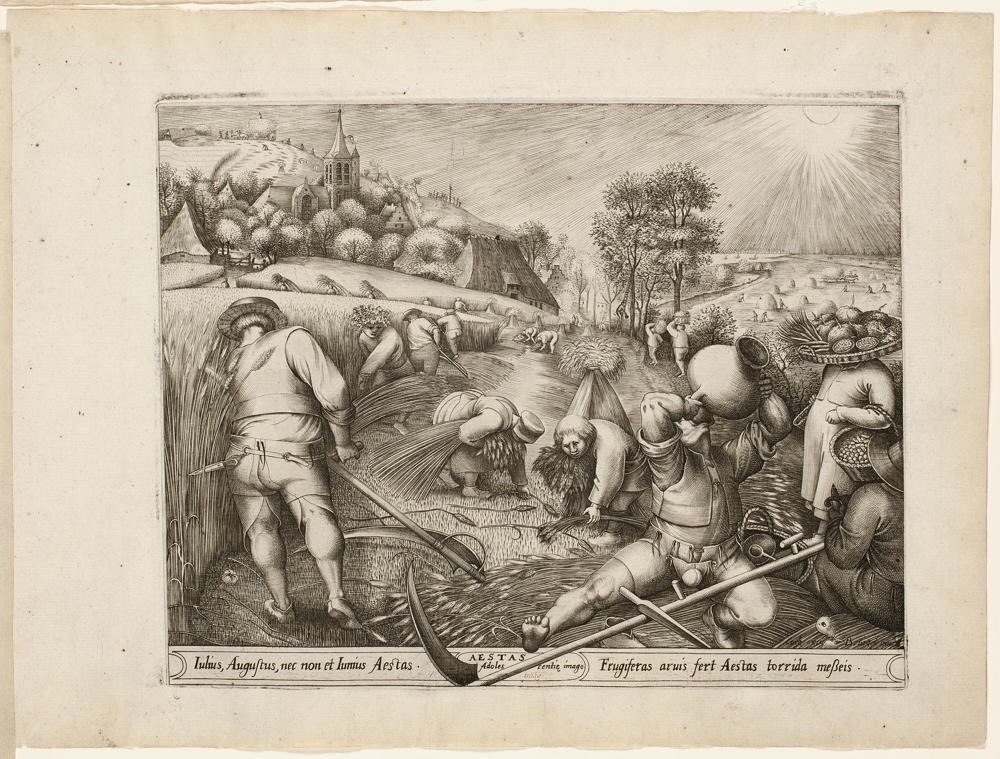
Pieter van der Heyden: Summer, from The Four Seasons (1570)
published by Hieronymus Cock
"I can expect another little insubstantial rain shower along about September."
Every day for the past month or so, the news has been reporting the most savage series of flash floods I remember. Past summers have not been nearly this tumultuous, with perhaps a narrow tornado season followed later by an equally narrow hurricane one, but this summer has seen a seemingly unending series of record-setting, thousand-year floods following unprecedented downpours measuring in inches of Moisture per hour. As usual, my little corner of this world, the one overlooking the absolute center of the universe, where gravity always works reliably, has seen nothing even distantly resembling these calamities. We've experienced our more or less usual Moisture so far this summer, the negative kind. Through June, we received barely a distant whisper of rain, resulting in a net negative Moisture month for us again. We've been praying for rain, while further east, they've been praying for its cessation.
We worship the god of moisture, believing it makes life here possible.
MeetingMyself

Allart van Everdingen: Rabbit meets Reynard in Field (17th century)
"The difference sure feels profound, though…"
As a writer, I mostly work through surrogates. It's not precisely that I do not show up for work when I work. It's more that when working, I primarily project. However introspective one of my stories might seem, creating them amounts to an act of extreme extroversion for this extraordinarily introverted writer. I usually speak to someone else when creating, my mythical reader, or the ether. Writing for me has never been a dialogue with myself, or even with the deaf. Even when I edit a fresh piece, it's more of an out-of-body experience than a conversation. I might burgle the opportunity for me to read my writing by the very act of creating it. It seems at least vaguely familiar even on first reading, probably because I just finished writing it. Editing demands a certain cold-hearted distance, akin to pruning shrubs or weeding tomatoes —a certain indifference. It is hardly an intimate act, best done at an emotional distance.
So, it was a rare occurrence when I found myself re-re-reading my Cluelessness manuscript, recently returned from final copyediting before publication, and caught myself immersed in what must have been myself.
StudyingMyself

Stanley Anderson, Engraver: Head Study (1908)
From: Samuel Putnam Avery Collection
"…I retain a few unanswered questions."
As I announced in Recovery, the episode of this FollowingChapters Series I posted just before yesterday's Weekly Writing Summary, my Cluelessness manuscript has returned from its final copyediting pass. I had both dreaded and warmly anticipated its return. I secretly feared that the copyeditor would uncover the depth of my long-secreted impostor syndrome and expose me for my presumptions. I also imagined that her efforts might somehow validate my talents, however modest, and justify my continuing this little vanity on into infinity. I received a bit of both, and also neither of what I'd so fervently hoped and feared. As I reported in Recovery, she’d employed a light hand, preserving what I'd imagined represented my voice while drawing a firm line between what might prove acceptable and what could never pass muster.
I characterize myself as more of a feral writer than a trained one.
Weekly Writing Summary For The Week Ending 07/17/2025

Angelo Caroselli: Summer (1620s)
Downward And In
I cannot decide whether I'm aging or just imagining myself aging. I have so far failed to convince myself that I'm growing any older. I see old classmates pass by, obviously aged in my remarkably youthful eyes. I should know, I submitted to cataract surgery ages ago, but I survived. Nobody ever very well remembers the struggles they endured, just the moments within which they surprisingly managed to convince themselves again that they were probably not aging.
I continually need to resolve some fairly obvious deviations from expectations.
Rediscovery
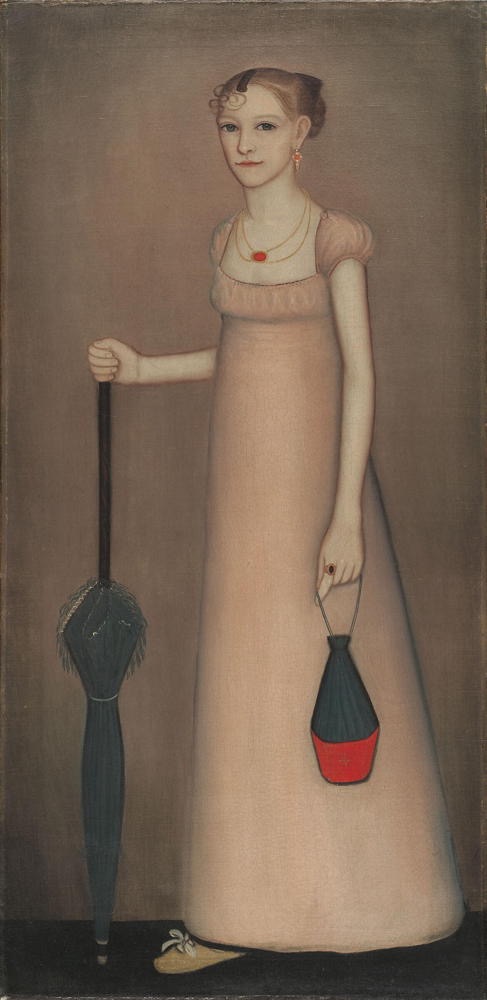
Ammi Phillips: Harriet Leavens [1802-1830] (c. 1815)
"…the direct eventual result of this writer writing."
Seven summers ago this morning, I was up writing very early, as had been my habit for just over a year by then. I had begun this writing discipline after a six-month-long Dark Night of the Soul wherein I wondered if I had ever—indeed, would ever—become a writer. I quelled my fretting by writing, a simple enough resolution in retrospect, but a serious question when still prospective. I speculated that if writers write, then I could only hope to answer the question of whether I was a writer by writing. I needed plenty of reassurance then, so I began by dedicating myself to daily stints. I'd write early in the morning, before my day could slip away from me. Neither the content nor the purpose mattered then, for I was just seeking reassurance. If I could maintain that modest commitment, I figured I might eventually consider myself to be the writer I aspired to become.
In reality, the effort proved to be a little more complicated, since this fresh dedication demanded a level of diligence I'd never invested in anything before.
FalseFlags

Johann Sadeler I: Micaiah and the False Prophets (16th-17th century)
"We're not quite there yet."
Since the 1930s, DC Comics character Superman has been presented as a staunch defender of "Truth, Justice, and the American Way." These three pillars of the society I was later born into remained reasonably stable until recently, when another ethic began to enjoy expanding influence. Our incumbent, schooled by the fascist gangster Roy Cohn, embraced a decidedly different American Way. His version rooted itself in falsity and injustice, reframing these as the supporting principles of his newer American Way, if I can even properly characterize falsity and injustice as principles. Our incumbent realized that truth could be effectively neutralized for any purpose by merely dispensing lies. These lies could not succeed if they were tentative. The liar would have to be all in if he intended to succeed. He would need to treat Truth as the ultimate enemy of his brand of democracy. He set about creating an alternate ecosystem where lies could thrive.
In the paper-rock-scissors game that comprises public opinion, the relative truth or fiction of any assertion matters little to the dedicated practitioner.
AntiPolicy

Utagawa Hiroshige 歌川 広重: A Cuckoo Against the Moon (c. 1843/46)
"They are their own worst enemies …"
Our incumbent holds no affirmative policy positions. I could insist that he holds no policy positions because those he has, or those he holds in lieu of holding affirmative policy positions, tend to be negative. He seems to be opposed to damned nearly everything, especially anything that even distantly hints at decency. This outlook places him and his anti-administration in a unique position, for they exclusively promote negative space outcomes. Try to envision a result should any of his anti-positions somehow come to fruition, and you will find yourself unable to agree with anybody on how those results will manifest. Each seems to project a strong sense of tangibility until and unless one tries to render them tangible. Asking the innocent question, "And if you achieved that, what would you have?" throws his spokespersons into inescapable disarray.
From a wannabe strong man, negative, AntiPolicy positions tend to sound powerful, like any espoused by any odd Old Testament God.
CityOfCards
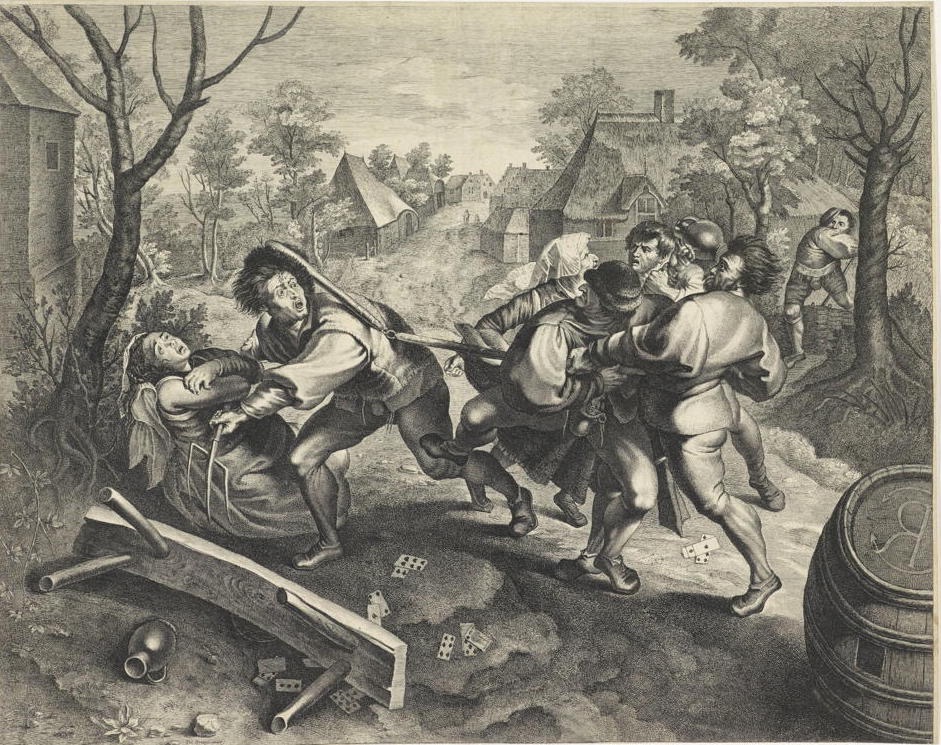
Lucas Vorsterman: Fighting farmers after a card game 1619-1675
Gallery Notes: Fighting farmers, after a card game. One holds a threshing flag and hits the other on the head, while another man tries to stop him. The other farmer has a pitchfork in his hands. A woman holds a jug and is prevented from hitting it by a man holding her wrist. In the foreground, a fallen bench, a jug, and a scattered deck of cards. In the background, a village.
" … the future refuses to disclose which castles topple next."
" … the future refuses to disclose which castles topple next."
Every half-decent charlatan masters the construction of at least one House of Cards. It takes an exceptional one to oversee the development of a Community of them, and a once-in-a-very-blue-moon one to fabricate enough buildings to result in a genuine CityOfCards. The City seems no less tenuous than the original single building, though it's exponentially more fragile if only because of the proximities of similar fragilities. One errant puff of wind, one clumsey addition, and the entire fabrication can crumble. After some point, the marvel no longer comes from the construction, but from the ever more unlikely preservation. The likelihood of catastrophic failure blooms as the charlatan continues adding roofs. He eventually can't stop himself from ever-more-frantically adding roofs.
The sure bets ride with failure, but then a second wind, if you'll excuse the expression, comes in to encourage ever more frantic and apparently successful construction.
Prafussee
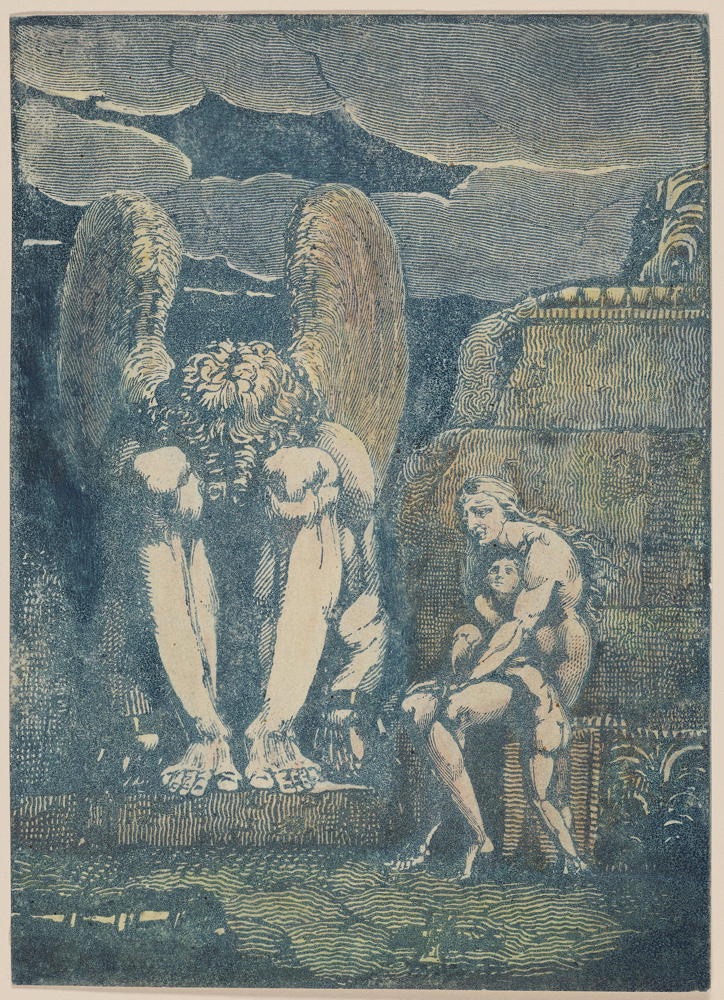
William Blake:
Frontispiece for "America a Prophecy" (1793)
"Anyone claiming today that they're directed by God has forgotten their history lessons or they might just be a charlatan."
News that reports some members of the incumbent's cabinet, public servants, believe themselves to be instruments of prophecy leaves me wondering whether insanity can be employed as a credible offense. Nobody can reasonably claim to be such an instrument, and if true, nobody gets to choose to become such an agent. I seem to remember some biblical figures cursing such an intrusion into their lives, neither particularly proud nor feeling rewarded by such a designation. Further, biblical prophecy so predates our circumstances that it seems much more than merely unlikely that scripture, retranslated innumerable times over many, many centuries, even if divinely inspired, could have accurately and intentionally targeted our times as its purpose. Further still, modern interpreters of such messages appear to interpret them literally, except in those special instances where figurative interpretations seem necessary. They seem capable of justifying anything by claiming scriptural sanction, and do.
Heaven help us survive this latest twist on justification.
Disintegrating
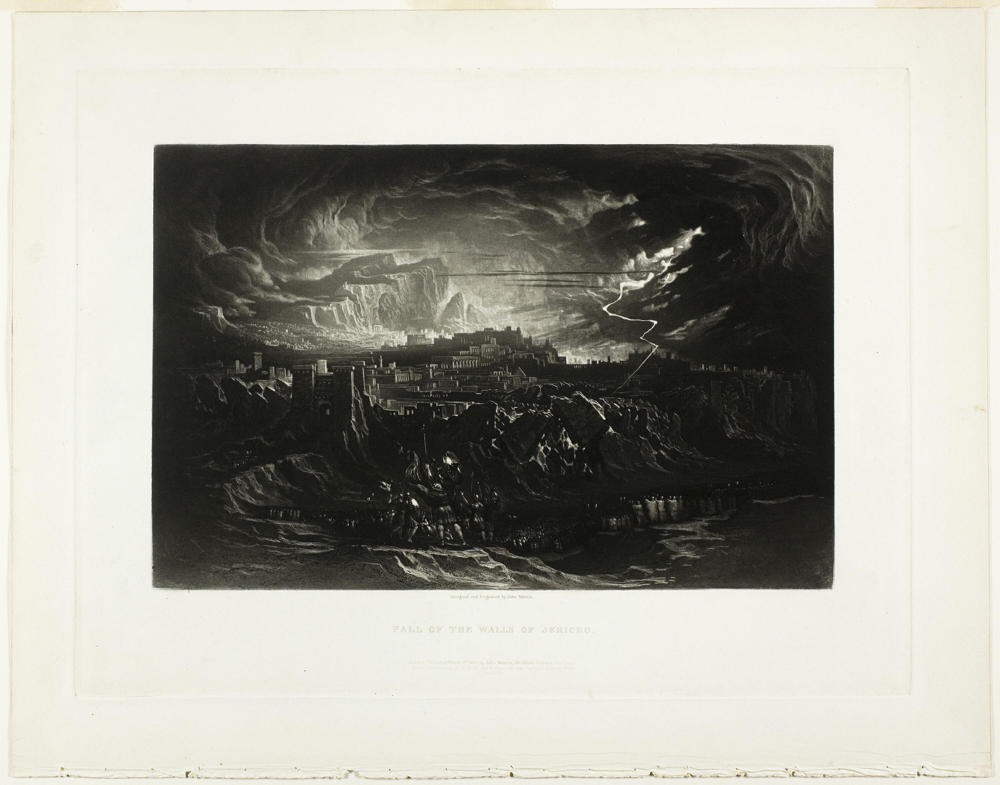
John Martin: Fall of the Walls of Jericho,
from Illustrations of the Bible (1834)
"It would never raise a credible head again. It's done."
The apotheosis appears as a trajectory more than a peak. At that point, nothing's obvious yet, though subtle and, in retrospect, not so subtle signs point to an inescapable conclusion. That arc peaked. It will never regain that height again. It's downhill from there, though not necessarily a power dive. There might be a series of plateaus and even a few apparent recoveries on the inevitable way down, but the momentum is lost along with the surprise that the initiative initially depended upon. Opponents easily anticipate what were once utterly baffling motives and moves. What seemed like magic was rendered barely tragic. Only theater remains. The outcome will never again find itself in serious question. So begins the slow shuffle toward the exits. What began as a mammoth traffic jam as everyone tried to arrive before the start winds down with people who paid through the nose for tickets leaving well before the end to avoid traffic or something.
Our incumbent still believes he successfully outsmarted everybody.
Weekly Writing Summary For The Week Ending 07/10/2025
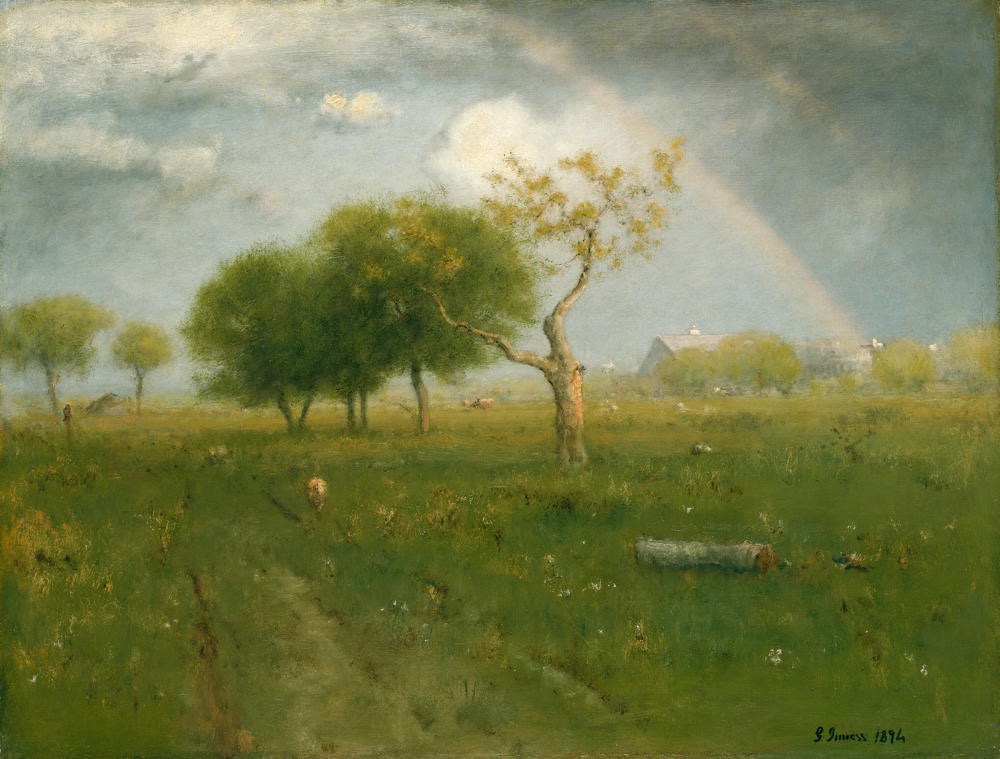
George Inness: After a Summer Shower (1894)
Now Must Be The Time
I once believed that a time might come when my patience would be amply rewarded, though I never invested much time defining what that payoff might entail. Would it come in the form of no longer needing to exercise patience? After all those decades diligently practicing my patience, I might have earned a payoff that promised only the continued practice, by then masterful, of ever more patience. I might have mastered waiting. It seems now, from the perspective of this once far and distant shore, that practicing patience itself might have always been the underlying purpose, promise fulfilled in the very act of striving to practice. Of course, anyone who has practiced patience understands that this practice never seems to approach perfection. Even the avid practitioner understands that even diligently practicing patience involves experiencing considerable impatience, too, and that it's ultimately a failed pursuit if judged too absolutely.
My mother's Uncle Curtis served as an early example of both diligence and patience.
BrightIdeas!

Harold Edgerton: Death of a Light Bulb (1936, printed later)
" … the crutial resource I need to deploy to succeed."
I learned early in my consulting career that my most successful clients started their projects with the worst ideas. These often seemed initially inspiring but ultimately unrealistic, and rarely survived into implementation. The less successful operations married their earliest notions and spent the bulk of their development efforts trying to avoid divorce. They would end up implementing something nobody really needed to satisfy some urge that hadn't survived the earliest phases. The most successful companies seemed to be most skilled at skewering their originating BrightIdeas!
I later realized that all development efforts start with BrightIdeas!
Lowbernation

Edward Clark Potter:
Sleeping Infant Faun Visited by an Inquisitive Rabbit (1887–89)
"All might be right with the world contained within the midsummer guest bedroom walls."
Midsummer brings a lethargy every bit as overpowering as any mid-winter might induce. In both instances, the weather turns inconveniencing, even menacing, introducing a definite reduction in initiative. If I'm not finished with my outside work by ten in the morning, I'm best off just forgetting about making progress that day. When the mercury fails to make it below seventy overnight and has already climbed to eighty before six, its trajectory becomes obvious. This is a performance I've seen before. In my youth, I'd head for the swimming pool and stay in the deep end all afternoon. Now, I head for the guest bedroom to lie beneath a screaming ceiling fan to read another detective novel until I doze. I swear I never know where any of those afternoons go.
I later take to the back deck and water the planters.
Tariffied

Lucian and Mary Brown:
Untitled [baby reaching for typewriter] (c. 1950)
"Nobody ever applauds a terrorist."
Far from appearing to be a skilled negotiator, our incumbent exasperates his counterparts by continually switching his terms. On trade, he made up a "novel" definition of tariff, one which no economist can make heads or tails of. He promises one thing before reneging, typically delivering some punishing terms to trading partners who've loyally served as our manufacturers for decades. Even where no hope of developing domestic production exists, he hits a former partner with some punishing, seemingly random blow. Nobody knows what he's trying to do. If anything shines through his increasingly thin veneer of sanity, his trade negotiation policies qualify as nearly pure insanity. Or, perhaps, they're only inanity. The two seem indistinguishable in him.
The urgent need to seem victimized might fuel much of this theater.
Disasters

Thomas Rowlandson:
The Double Disaster or New Cure for Love (July 10, 1807)
Published by Thomas Tegg
" … after the previously almost unthinkables start occurring regularly again."
In an apparent contradiction, MAGA governance has ushered in an unprecedented —and indeed, previously unthinkable — number of Disasters. From airplanes suddenly falling out of the sky or inexplicably leaving taxiways on takeoffs or landings, to so-called Natural Disasters, those deemed caused by acts of a somewhat less than benevolent God, the MAGA-verse has seen more and worse than recent administrations. While the incumbent hastily explains that these can be traced to lingering effects of President Biden's administration, no explanation seems entirely necessary. Actual Disasters come from nowhere, are utterly unforeseeable, and provide almost endless potential for sympathetic photo opportunities. Few things demonstrate an administration's authority more than mustering the National Guard to help locate flood victims with their Hueys. This sudden spate of horrible events might have boosted the incumbent's ratings.
His incessant budget cutting and reallocating could be seen as at least a proximal cause of this shocking increase in Disasters.
3rdWorld
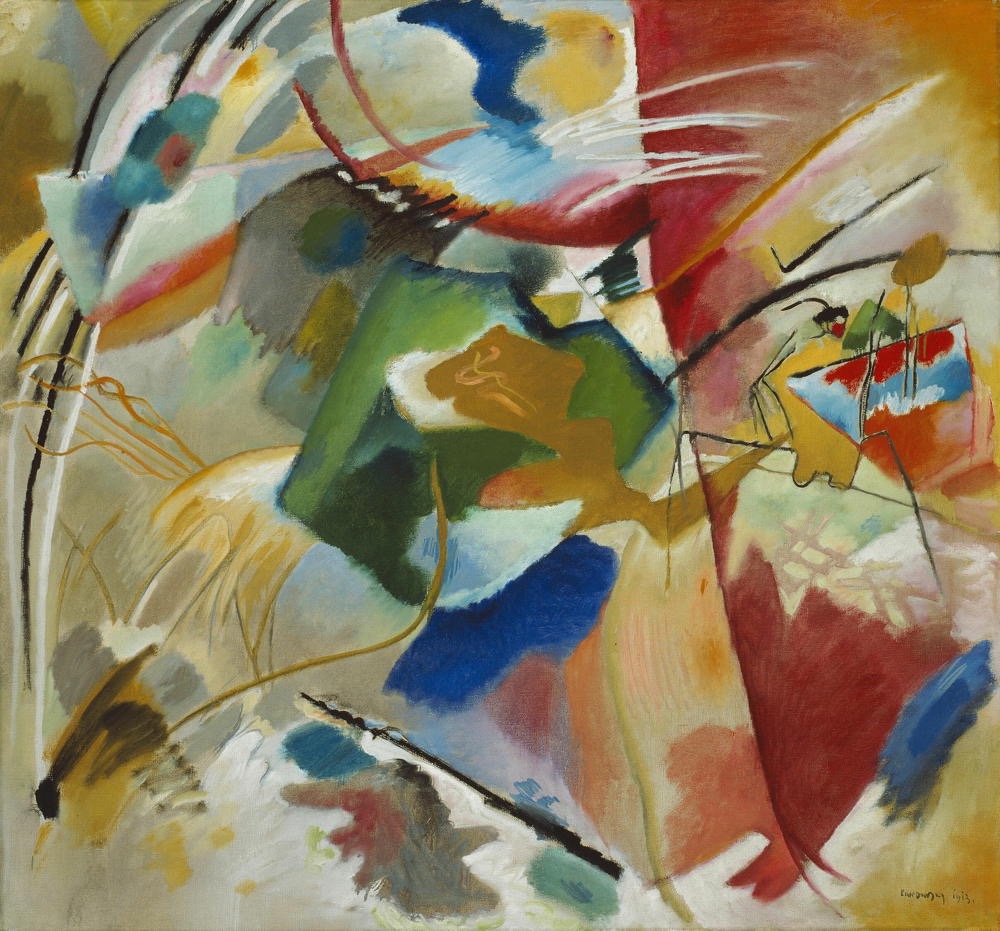
Vasily Kandinsky: Painting with Green Center (1913)
"Nobody imagines us essential anymore."
I was born into THE 1st World nation. Others would catch up to become almost our peers, but for nearly all of my years, my country held distinct advantages over every other country in this world. In the early years, this advantage encouraged our compassion. Sure, we still exhibited vestigial evidence of a lingering arrogance, but we were most often seen as benefactor and breadbasket, goodwill ambassadors more than vicious competitors, except with the Communists, of course, but we invented our Communists because we needed the appearance of competitors. We could well afford to be egalitarian, and we befriended everyone we could. We agreed to host the United Nations headquarters, and few could question the reason. We were the original democracy, and we were definitely interested in sharing our social technology, even when, unfortunately, it was not of our target's choosing.
We always had a primitive minority who opposed modernity, seeing government programs as reckless intrusions into sacred traditions.
UnAmerican
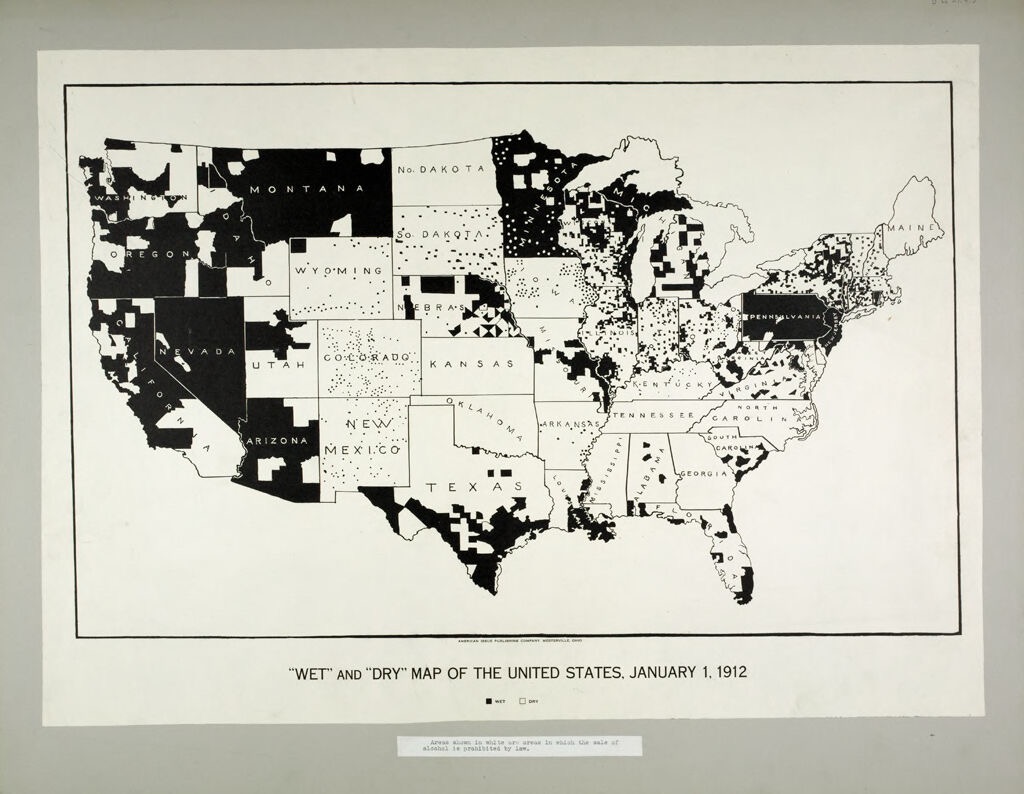
American Issue Publishing Co.: Liquor Problem: United States.
A "wet and dry" Map of Temperance Reform in the U.S.:
"Wet" and "Dry" Map of the United States, January 1, 1912:
Areas shown in white are areas in which
the sale of alcohol is prohibited by law.
(1912)
"I wonder if we can survive until the curtain rises on our next performance."
This year's 4th of July, coming on the day our incumbent signed the most repressive bill in American history, didn't hardly seem worth celebrating for many, me prominently included. I moped around the place, grieving for a fictional America I still believed in, for that's what makes me an American. This new bill seemed too gawd-awful cynical to accurately represent actual American interests. It seemed unworthy of even any Banana Republic, and might be evidence that we've finally gone and done it, become the very opposite of our Founders' originating intentions.
There was always much contention between the pretensions necessary to maintain governance and what are widely considered to be rights and freedoms.
Weekly Writing Summary For The Week Ending 07/03/2025

George Platt Lynes: Frederick Prokosch [writer] (c. 1950)
Worsen Our Collective Experience
I suspect that one of these days, the old Father Forgive Them For They Know Not What They Do routine will finally lose traction, especially in a country predicated upon the notion that we could and so really should be striving to improve rather than incessantly backpedaling. Our latest ignorance seems forced and unconvincing, as if we had not been living for the last three-quarters of a century. Ignorance didn't used to be a choice. It could appear without overdue blame before the Enlightenment. After, those who chose to ignore history's lessons tended to undermine themselves, so most avoided dabbling in it on anything like a societal scale, except for those who gained their power and authority by associating with the biggest losers in history. One by one, the more primitive philosophies bowed down to emerging realities, and while all was still not entirely right with this world, things were arguably better, enviably so.
But being human, we couldn't just accept obvious improvement and retire to smell sweet roses.
Cluelessnesses

Raphael Sadeler, the Elder:
Allegory of Wealth, Lust, and Stupidity (1588)
" … some just manage to cope better with its presence."
M'Lord's Prayer
Our Father, who art in our imagination,
Hallowed be thy name.
Thy kingdom come, thy will be done
on Earth as within our deepest intentions.
Give us this day our enriched white bread,
And forgive us our debts
As we persecute our debtors.
Lead us well beyond temptation and
Forgive us our Cluelessnesses
As we persecute those who seem most clueless to us.
Award us the franchise to deliver evil,
that we might finally vanquish decency,
For thine is the power and the glory
We intend to invoke forever and ever. Amen
Raphael Sadeler, the Elder:
Allegory of Wealth, Lust, and Stupidity (1588)
" … some just manage to cope better with its presence."
M'Lord's Prayer
Our Father, who art in our imagination,
Hallowed be thy name.
Thy kingdom come, thy will be done
on Earth as within our deepest intentions.
Give us this day our enriched white bread,
And forgive us our debts
As we persecute our debtors.
Lead us well beyond temptation and
Forgive us our Cluelessnesses
As we persecute those who seem most clueless to us.
Award us the franchise to deliver evil,
that we might finally vanquish decency,
For thine is the power and the glory
We intend to invoke forever and ever. Amen
Humildity
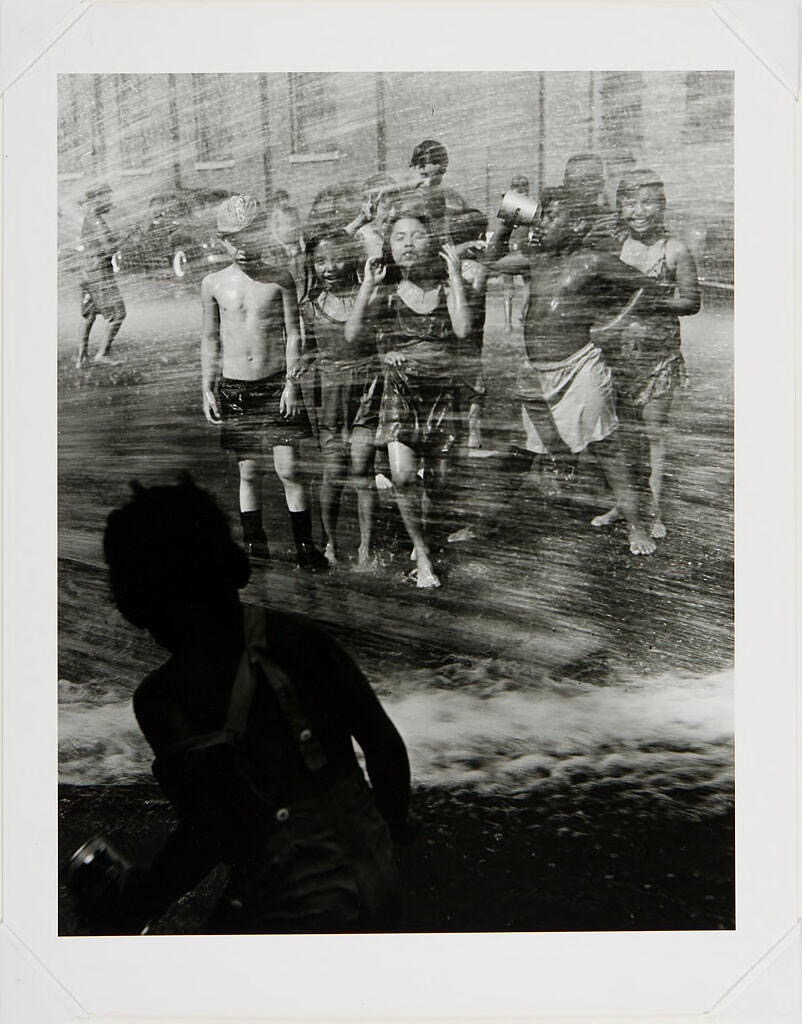
Wayne Miller: Heat Wave, August 1947 (1947)
" … shirts that wrinkle far too easily in such low humidity."
When I was twenty-three,I experienced high humidity for the first time. I could not believe that people could tolerate living with it, that every soldier in the Civil War wore a heavy felt wool uniform and still managed to move around in that stuff. I promptly contracted a severe case of sun poisoning, a condition I had previously been blissfully unaware of existing. It occurs when bright sunlight filters through extremely moist air. The effect seemed similar to what happens when sunlight passes through a well-focused magnifying glass. I blistered and felt seventh-circle-of-Hell horrible for a week, taking ice baths and slathering ineffective calamine lotion all over my upper body. I had never really bought in to the concept of an Old Testament vengeful God until that experience. I wear long sleeves and havelocks through my summers now.
Summers here near the center of the universe feature a drier heat, the sort that vacationers to the Southwest use to explain away triple-digit temperatures.
Moosenator

John Woodhouse Audubon:
Servus alces, Moose Deer. Old male & young. (1845-48)
" … a little heaven here in The Villa so close to the center of our universe."
I have no more steady companion than our formerly feral male cat Max. Since he became a member of our entourage five years ago, he has accumulated a fair raft of nicknames, if only because he's a member of our family and everybody in our family gets assigned at least one nom de famille. He sports several, including: Maximum, Moose, and Moosenator (pronounced Moose-EN-a-tor). Those who ask why I call him moose, I answer by insisting it was because of the antlers. Of course, The Moose does not actually have antlers, which might be my point. Perhaps the finest reason to assign nicknames in the first place involves the creation of an absurdist mythos around the old family unit. I imagine myself a budding Roald Dahl, writing a book about the wholly unlikely adventures of a typical American family who just happens to have a Moose and a Muse involved. I believe that every life requires some air of mythic mystery surrounding it. Mine features a Moose.
The Moosenator is clever, but not particularly intelligent.
Trepidation

Alfred Stieglitz: Self-Portrait with camera, tripod, and pistol (1886)
"It feels like the thousand deaths …"
This week promises to become one of those weeks that were. So many weeks come and go without leaving many footprints. I recently failed to recall entire quarters where I'd dedicated myself to writing series now lost to memory, if not necessarily to history. I reassured myself that nobody remembers all the books Twain wrote, and he remains perhaps the most popular writer in our history. This week, my copyeditor promised to deliver her completed work on my pending manuscript. I am not warmly anticipating reading her results. Though I firmly believe in the copyeditor's beneficial contribution, I would have preferred to forego this specific stage of manuscript development. I'd asked her last December if she could provide a quick check to prove that my manuscript required her effort. She asked me to send her a few pages. She almost immediately responded that she found five glaring errors in the first paragraph!
Humbled into acceptance then, I told her I'd get back to her after some deeper consideration.
DaysOff

Russell Lee: Seaside, Oregon, is vacation spot (1941)
United States. Farm Security Administration
"My work, my play."
I don't take vacations. DaysOff seem out of the question. My summertime's filled with obligations that effectively prevent me from leaving home. Who would water the gardens and tend the cats? More than that, who would write the daily missive if I went missing? I understand that my time isn't refundable. If I miss a day, I've forfeited it, never to be recovered. I will never again stand in that place or time. I feel a sacred obligation to keep my nose near to this grindstone. When I have to go away, I take my business with me. I can rise just as early elsewhere as I can rise here, so my production continues even if I'm jury-rigging connections in a tiny hotel room in Paris. I will consent to visit, but I will not agree to suspend my writing for even a day.
I do not write for a living; I live to write.
CounterIntuitive

Jack Gould: Untitled [women lined up in front of counter,
seen from behind shop counter] (c. 1950)
"We're destined to become mere observers of our computations."
A great myth was created at the dawn of the personal computing age. Before then, when computing exclusively resided within large organizations, computer professionals took considerable pride in their ability to work within tenaciously hostile intellectual environments. They were, after all, professionals, so their methods and practices should have, by all rights, remained obscure and mysterious to the general public. These professionals reveled in their status as eggheads and were seen as much more intelligent than the Average "Regular" Person. Many became conversant in what was properly referred to as "machine language" and could think and dream in ways never imagined by Average "Regular" Persons.
The dilemma arose when technology advanced to the point where personal computers became feasible.
Weekly Writing Summary For The Week Ending 06/26/2025
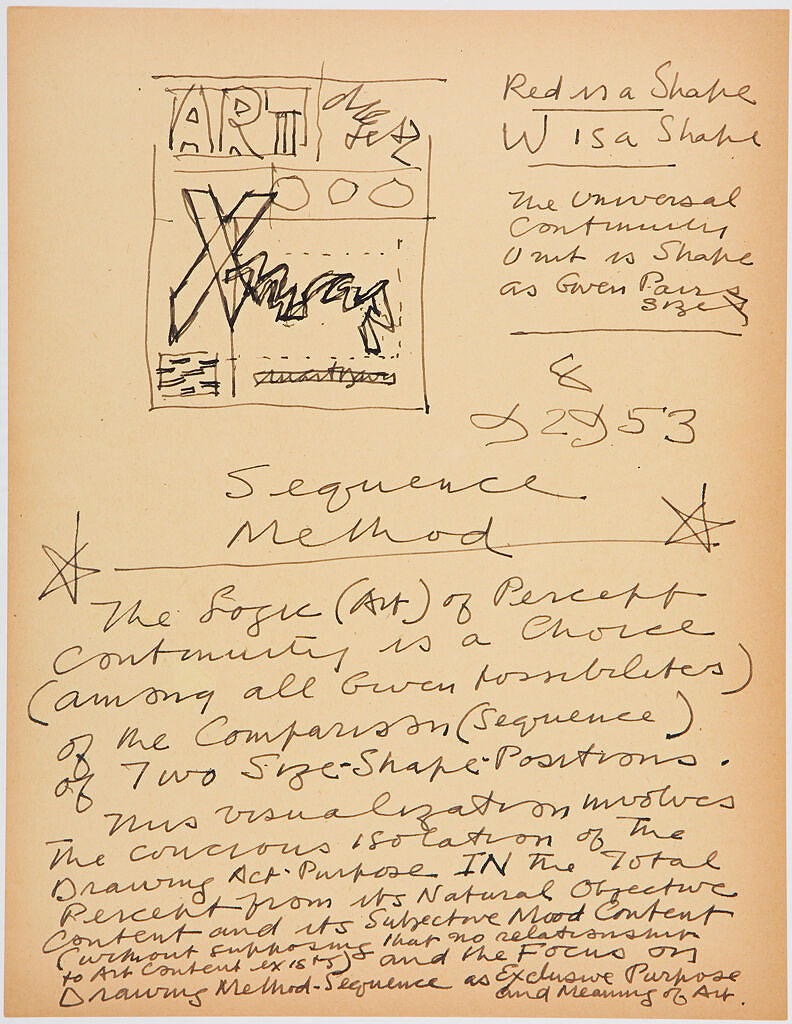
Stuart Davis: Study for “’Art Digest’ Cover” (1953)
Just Like This Administration
Physicists maintain a unique sort of humor within their ranks. They award an Ignoble Prize to scientists performing particularly absurd studies. They're attracted to Irreproducible Results. They amuse themselves analyzing Cartoon Physics, the sort to which Wylie Coyote runs sideways. Does Coyote Gravity exist? It turns out that, while the realization that nothing supports you doesn't actually trigger gravity into action, a discernible delay comes into play when someone inadvertently attempts to walk on air when blindly running off the end of a mesa. Objects do not flatten to the extent shown in cartoons when running full speed into an immovable object, though some flattening does occur.
Our incumbent engaged in Cartoon Physics last week when explaining what happened when some Bunker Buster® bombs hit an Iranian uranium enrichment facility buried deep underground.
TechTalk

Kate Greenaway: The disappointment. (1890)
"I will be back at it again tomorrow morning."
Technology promised what every innovation has always promised: ease. It has yet to deliver. Not that this failure has chased off many customers. I know of nobody who made good on their pledge to rid themself of their frustrating technology. No, we return with fresh hopes the following morning, only to rediscover the depth of technology's betrayal. It does not seem to care. It seems incapable of giving a damn. We stopped being mere users decades ago, before our technology became this convoluted. Tangle built upon previous tangles to produce a mess whose designers probably don't understand.
My technology holds the power to transform me into a whimpering eight-year-old at virtually any time.
Broken

J. B. B. Wellington:
The Broken Saucer (c. 1880/90, printed April 1890)
" … not even duct tape holds anything together forever."
I have attained an age where much of what surrounds me seems Broken. I suspect that this acknowledgement accompanies aging, since in my more innocent youth, I seemed surrounded by more operational than Broken stuff. My stove-top espresso maker's handle was missing this morning. It had broken off a few weeks ago when the house cleaner accidentally knocked it off the countertop. I'd fixed it with some superglue, and that held until a few days ago, when it let go. I learned that I'd have to find some high-temperature glue to more permanently fix it, so I placed that need into my ever-burgeoning pending queue. I'll get around to finding that when I finally get around to finding that, assuming I ever remember to. In the meantime, I discovered that two pot holders held just so suffice as a fix until something more permanent manifests.
Much of my existence seems to be suspended in just that state: Pending Something More Permanent.
Preference
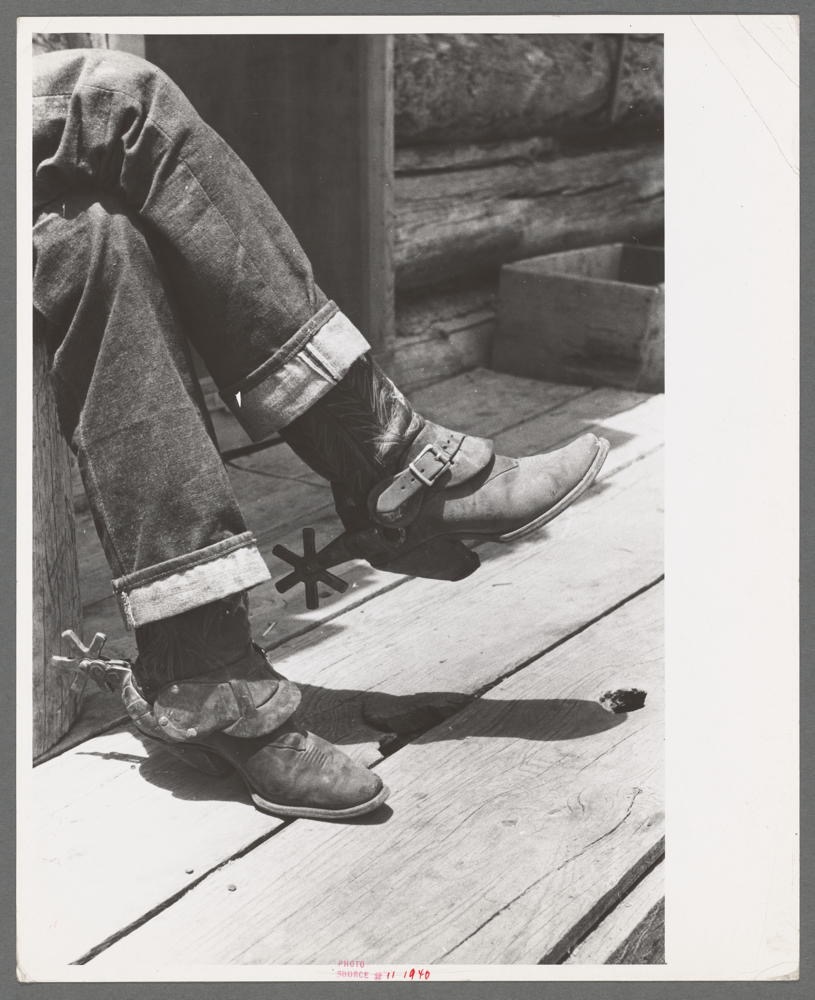
Russell Lee: Detail of farmer's blue jeans, boots and spurs.
This man was once a cowboy and still prefers the cowboy's dress,
Pie Town, New Mexico (1940) Farm Security Administration
"I expect that I'll always struggle to get in touch with my heart's desire …"
I struggle when responding to anyone asking about my preferences. I was raised to be more sensitive to what others prefer than to my own preferreds, a valuable skill in a family with five kids where neediness easily translated into a form of weakness. I learned early the value indifference brought and the cost neediness wrought. I was rarely considered to be a picky eater. Quite the opposite, I was known for my adventurous palate. My dad "preferred" chicken backs so his kids could feast on the meatier cuts. My mom could turn into a genuine Christian martyr sometimes, denying her personal preference in deference to her kids'.
Making matters worse, when I was in Junior High School, I found an old Victorian text in the local Goodwill book section, “The Kingship of Self-Control.” I took that book to heart.
DroppingIn

Harold Edgerton: Milk Drop Coronet (c. 1936)
" … not nearly as alone in this world as we could have sworn we were sometimes."
Most of us live well-regulated lives. This renders us more predictable than we might be otherwise. There is no question about whether we imprinted on hunter-gatherer or farmer behavior. We're definitely farmers. We rise at just about the same time each morning. Through the day, we follow a schedule that defines our edges. We reliably show up for supper at the usual time. We even regulate our vacations, planning routes, stops, and experiences. We try to leave little to chance.
Hunter-gatherers, though, left much to chance.
Priorities

Ben Shahn:
Untitled [Washington Court House, Ohio] (July-August 1938)
"The evil done in our name serves as the greatest evil of all."
Our incumbent waddled off his golf course to fly back to his supposed home to deliver another borderline incoherent rant about something. He sounded triumphant as he spewed his usual paradoxes, pleading for a peaceful end to a violent engagement he initiated. So much for the great negotiator, now reduced to pre-emptive triumphalism.
The Muse and I had spent our day harvesting.
FollowingMyself
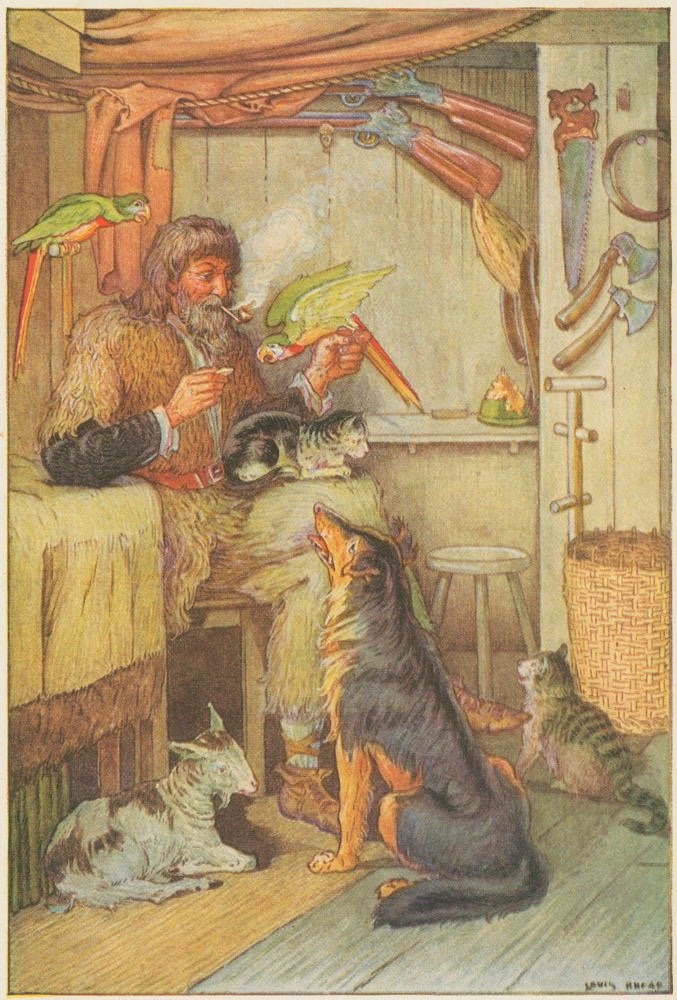
Louis Rhead: I diverted myself with talking to my parrot (1900)
— Illustration from 1900 William Taylor edition of The Life and Strange Surprizing Adventures of Robinson Crusoe, of York, Mariner: Who lived Eight and Twenty Years, all alone in an un-inhabited Island on the Coast of America, near the Mouth of the Great River of Oroonoque; Having been cast on Shore by Shipwreck, wherein all the Men perished but himself. With An Account how he was at last as strangely deliver'd by Pyrates. Written by Himself. (Popularly known as Robinson Crusoe.)
" … accepting that I'm finally in charge of FollowingMyself."
Beyond a certain uncertain point, I find I have to lead myself. The trailblazers and popularizers I once looked to for direction have either left the building or proven themselves incapable of further advising me, so divergent have our paths and aspirations become. What early in my careers became an identity struggle has laid down its weapons. My identity is finally no longer a mystery to me. Neither are my fallacies. I more deeply understand my underlying absurdities as well as my fundamental decencies. I remain incomplete yet almost complacent, satisfied having life come at me, finally understanding and accepting that I never really had any alternative. I have arrived.
Where I've arrived might not matter.


